|
January 2012 Updates
No Followers at Secondhand...

01.31.12 (Shevat 7, 5772) Soren Kierkegaard reminds us that there are no followers of Yeshua "at secondhand," and that all of us are therefore truly "contemporaries" of the resurrected Messiah. God is not a respector of persons, and there remains the same proximity between Yeshua's contemporaries and those of us who are living today, near the end of this age. No one can "follow Jesus" by reading the abstract speculations of theologians, just as no one can learn about Him as an archaeologist might study a relic of the past... No, the Name of God, the Tetragrammaton (יהוה), means: "God is Present" (i.e., it is a play on the Hebrew verb hayah [הָיָה], "to be"), and therefore we only come to know God through living faith - just as Yeshua's first disciples came to realize who He was... The same may be said regarding our spiritual "adoption" in heaven: Each person, whether Jew or Gentile, must be adopted into God's family... Our identity is a matter of faith in God's promises, not on race, DNA, or family lineage. If you are truly one of God's children, understand that God is your Heavenly Father and that relationship takes priority over the seeming way of the flesh in this world... Just as there are no "secondhand" disciples so there are no secondhand children. God doesn't have any grandchildren in heaven, only children: He is not your "heavenly grandfather" but your heavenly Father (אֲבִיכֶם בַּשָּׁמַיִם).
Dwight Moodly once said, "God sends no one away empty except those who are full of themselves." Similarly, Matthew Henry observed that "many ask good questions with a design rather to justify themselves than inform themselves, rather proudly to show what is good in them than humbly to see what is bad in them." It is rarely the "professor" or even the "admirer" who evidences real faith, since they are often moved by motives that disclose something other than the heart of the Father:
"Loftiness is naturally an easy thing, and to feel oneself drawn to it is easy enough. But Christ who from on high draws all men to Himself does not take them out of the world where they live, and therefore to everyone who is drawn unto Him in the heights will experience lowliness and humiliation as a matter of course.
This Christ knows very well; and He knows also that the permission to begin with the easiest, or with what seems the easiest, is a necessary deceit in the process of education, and that the fact of it's becoming harder and harder is in order that life may become in truth a probation and examination… A man has to be handled carefully, and hence it is only little by little that his task is made clear to him, little by little he is screwed tighter and tighter by the greater and greater and greater effort of probation and examination. So little by little it becomes for the individual a serious truth that to live is to be examined, and the highest examination is this: whether one will be in truth a Christian or not." (Kierkegaard, Training in Christianity)
While many people may "admire" Yeshua's ethical teachings, they stumble when they are confronted with His cross... Yet this is the heart of the message of God's love: the greatest good is revealed in the suffering of Yeshua for our sins (1 Cor. 2:2). The Master of Life was "despised, rejected of men, a man of sorrows and acquainted with sickness" from whom people turned away their faces in disgust (Isa. 53:3) -- and we are called to take up the cross and follow Him... "When Christ calls a man, he bids him come and die..." We identify with the mission of God's love and smolder through the days and nights under constant self-examination our heart's motivation. Following Yeshua means being a witness to His truth, and retaining the message of His love in a world of ambiguity, pain, and testing....
For those who are God's children, testing in this age is designed to impart the character and image of God's son within our hearts. As C.S. Lewis once remarked, "God doesn't love you because you are good, but He will make you good because He loves you." He shows us a "severe mercy..." It is a fearful thing to fall into the hands of the Living God (אֱלהִים חַיִּים), though I would rather be corrected by our LORD than to be judged along with this world.
 |
Keeping Focused...
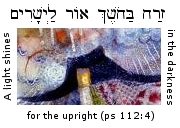
01.31.12 (Shevat 7, 5772) Where it is written, "cast all your anxiety on him because he cares for you" (1 Pet. 5:7), the word translated "anxiety" (μέριμνα) comes from a Greek verb (μερίζω) that means to be fragmented or divided into parts and pieces. Being anxious is therefore the uneasy state of being unfocused and divided within oneself... King David understood the need for a unifying principle for his life: "One thing I ask of the Lord; that is what I will seek" (Psalm 27:4). He understood that walking in the truth required "uniting his heart," or "repairing the breach" within his inner affections so that he could experience reverence and awe before the Divine Presence (Psalm 86:11). King David knew that "right desire is the deepest form of prayer."
שִׁוִּיתִי יְהוָה לְנֶגְדִּי תָמִיד
כִּי מִימִינִי בַּל־אֶמּוֹט
shiv·vi·ti · Adonai · le·neg·di · ta·mid
ki · mi·mi·ni · bal · e·mot

"I have set the LORD always before me;
because he is at my right hand, I shall not be shaken"
(Psalm 16:8)

Hebrew Study Card
The Scriptures warn that a "double-minded man is unstable in all his ways" (James 1:8). The word translated "double-minded" is dipsuchos (δίψυχος), a word formed from δίς, "twice" and ψυχή, "soul." The word describes the spiritual condition of having "two souls" that both want different things at once. Being double-minded therefore describes a state of inner ambivalence, of having two separate minds holding contradictory thoughts. (In a sense, being double-minded is an affliction for the person of faith, since the unregenerated person lacks even the capability for collision within the heart.)
To repair this breach, to unify his heart and its affections, David determined to "set" the LORD before him. Note that the verb "set" here is piel, that is, intensive... We must intently focus our mind and heart to regard ourselves as in the Presence of God; we must sense His eye upon us and "know before Whom we stand." The sages say that when David wrote these words, he was referring to the scroll of Torah which he kept tied to his arm. David literally "set" the Word of the LORD upon his right hand to help him keep focused (shel yad).
Many people live in regret over the past or in dread of the future. The Hebrew name of God, the Tetragrammaton (יהוה), means: "He is Present." We can only find God now, today, at this hour. Today if you hear His voice... Yeshua said, "The kingdom of heaven is within you" (מַלְכוּת הָאֱלהִים בְּקִרְבְּכֶם), that is, is to be found within the heart of faith (Luke 17:21).
"If you want to know about Heaven and what Heaven is, you do not need to cast your thoughts many thousands of miles off, for that place, that heaven thousands of miles away, is not your Heaven. The true Heaven is not a created place but an uncreated place, and it is not found in a particular place but everywhere, even in the very place where you are standing and going. For when your Spirit within yourself is able to penetrate inwardly through and beyond your own flesh and life, and is able to catch hold upon the innermost moving of God, then you are clearly in Heaven."
- Jacob Boehme (1575-1624)
Purity of the heart is to will one thing... When we are anxious, we become inwardly fragmented or divided, and thereby lose our sense of identity and purpose in this world. God invites us to come boldly before Him to find help (Heb. 4:16). He is a "very present help in trouble" (Psalm 46:1). We cast our burdens upon the LORD so that He can sustain us (Psalm 55:22), and that we may have a "right spirit" (רוּחַ נָכוֹן) renewed within us (Psalm 51:12). We can bring our brokenness to God - including those distractions that tear us away from Him and that make us inwardly "two-souled" - to find healing for our hearts. When we do so, we will discover the Source of Power that makes us "unshakable and always able to abound in every good work" (1 Cor. 15:58).
Humility and Teachability...

01.30.12 (Shevat 6, 5772) It is nearly an axiom of human nature that people are unreasonably proud, and yet many of us would be offended if someone suggested that we we were proud ourselves.... Yet surely we are all subject to "hidden faults" (נִסְתָּרוֹת) and "presumptuous sins" (זֵדִים) that lurk within the human hearts (Psalm 19:13), and if there is one ubiquitous fault that besets mankind, it is that man tends to overestimate his virtues while simultaneously underestimating his vices...
רָאִיתָ אִישׁ חָכָם בְּעֵינָיו
תִּקְוָה לִכְסִיל מִמֶּנּוּ
ra·ee'·ta · eesh · cha·kham · be·ei·nav?
teek·vah · leekh·seel · mee·me·noo

"Do you see a man who is wise in his own eyes?
There is more hope for a fool than for him."
(Prov. 26:12)
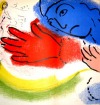
Note that the Hebrew word for "fool" here (i.e., kesil: כְּסִיל) refers to a dullard, or a boorish and "thickheaded" person who is enamored with his or her own opinions. A kesil is someone who believes his or her own propaganda, who always regards himself as "right," and who becomes obstinate or defensive when challenged... Sadly, since nearly all people are taken captive by this sin, our world is generally foolish and therefore without hope.
The humble person, on the other hand, acknowledges that he might be wrong and is willing to examine his views... He is genuinely open-minded and willing to undergo self-examination. He has the courage to say to the LORD, "Search me, and know my ways; test me, and know my thoughts; and see the wicked ways in me – and lead me in the way everlasting" (Psalm 139:23-24).
The sages rhetorically ask, "Who then is wise?" and answer "the one who learns from every man." In the Jewish tradition, humility (i.e., anavah: עֲנָוָה) is among the greatest of the virtues, as its opposite, pride (i.e., ga'avah: גַּאֲוָה), is among the worst of the vices. Indeed God literally hates the eyes of the proud countenance (Prov. 6:16-17). Therefore Moses is described as the most humble of men: "Now the man Moses was very humble, above all the men that were on the face of the earth" (Num. 12:3), and likewise the great patriarch Abraham confessed to God: "Behold now, I have taken upon me to speak unto the Lord, who am but dust and ashes (עָפָר וָאֵפֶר)" (Gen 18:27).
It has been said that a mark of this present wicked and debased age is the inability to feel real shame (בּוּשָׁה) for sin... We are a shameless people who brazenly defy the Living God by arrogating to ourselves supposed powers of wisdom that we surely do not possess... "Woe to those who call evil good and good evil, who put darkness for light and light for darkness, who put bitter for sweet and sweet for bitter! Woe to those who are wise in their own eyes, and shrewd in their own sight (Isa. 5:20-21). But the right use of shame is a blessing for us, as has been taught by the sages: "Come, my students, and I will teach you about the virtue of shame (i.e., boshet: בּשֶׁת). Know, my students, that shame is very important because everyone who exhibits shamefacedness (i.e., boshet panim) is rescued from sin and iniquity. As it is written, "Do not be afraid, because God has come to test you so that the fear of God will be on your faces (תִּהְיֶה יִרְאָתוֹ עַל־פְּנֵיכֶם), lest you sin' (Exod. 20:20). Moreover, shame is the proper attitude we should have before the LORD for the great atonement He graciously provides us in Yeshua our LORD. As it is written, "I will establish my covenant with you, and you shall know that I am the LORD, then you will remember and never open your mouth again because of your shame, when I atone for you for all that you have done, declares the Lord GOD" (Ezek. 16:62-63).
It has been wisely said that humility means "teachability." Dwight Moody once said, "God sends no one away empty except those who are full of themselves." Confessing that we sometimes are proud and foolish is therefore a first step toward finding inner peace and serenity. May the LORD help each of us humble ourselves before Him so that we can hear His voice and be filled with truth of His glory. Amen.
 |
Shabbat Shirah - שַׁבַּת שִׁירָה
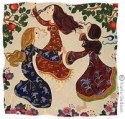
[ The following is related to this week's Torah reading (Beshalach). Please read the Torah portion to "find your place" here.]
01.30.12 (Shevat 6, 5772) Perhaps the central event of this week's Torah portion is how the LORD split the waters of the sea to make a path for His people to escape from Egypt. This event is commemorated in the "Song the Sea" (i.e., Shirat Hayam: שִׁירַת הַיָּם), a hymn praising God for His deliverance (Exod. 15:1-21). Because of its great importance for the Jewish people, the Sabbath on which this song is chanted is called Shabbat Shirah ("Sabbath of the Song"), and the custom is for all the congregation to rise while it is recited...
Because the crossing of the sea represents God's salvation - a "baptism," if you will, of the Jewish people - the Song of the Sea is customarily sung on the seventh day of Passover (i.e., on Nisan 21), which traditionally marks the date when Israel crossed the sea after leaving Egypt. When the Temple stood in Jerusalem, the song was sung every day by the Levites during the afternoon offering. After the Temple was destroyed, however, it was incorporated into the morning service to fulfill the Torah's commandment to "remember the day of your departure from the land of Egypt all the days of your life" (Deut. 16:3).
The song begins:
אָשִׁירָה לַיהוה כִּי־גָאה גָּאָה
סוּס וְרכְבוֹ רָמָה בַיָּם׃
עָזִּי וְזִמְרָת יָהּ וַיְהִי־לִי לִישׁוּעָה
זֶה אֵלִי וְאַנְוֵהוּ אֱלהֵי אָבִי וַאֲרמְמֶנְהוּ׃
יהוה אִישׁ מִלְחָמָה יהוה שְׁמוֹ׃
a·shi·rah · la-Adonai · ki · ga·oh · ga·ah,
sus · ve·ro·khe·vo · ra·mah · ba·yam.
o·zi · ve·zim·rat · Yah, · va·hi · li · li·shu·ah,
zeh · E·li · ve·an·ve·hu, · E·lo·hei · a·vi · va·a·ro·me·nu.
Adonai · ish · mil·cha·mah, · Adonai she·mo.

"I will sing to Adonai, for he has triumphed gloriously;
the horse and his rider he has thrown into the sea.
Yah is my strength and my song, and he has become my salvation;
this is my God, and I will enshrine Him, my father's God, and I will exalt him.
The LORD is a warrior; the LORD is his Name." (Exod. 15:1-3)
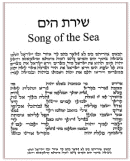
Download Study Card
The Torah states that when the Israelites entered the sea, it became dry land, with the water as "a wall (חוֹמָה) to their right and to their left" (Exod. 14:29). To commemorate this miracle, the Hebrew text of the "Song of the Sea" is stylized to resemble a "wavy wall," with the lines written in alternating "blocks" that suggest a wave of water:
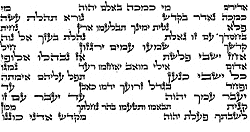 |
According to Yalkut Me'am Lo'ez, the alternating "bricks" are intended to resemble waves of water, while the blank spaces separating these (i.e., text blocks) suggest "blank spaces in our knowledge and praise of God" which we are encouraged to add to the "building." The sages count exactly 198 words in this song, which is the numerical value for the word tzchok (צחק), a word that means "laughter" and is the word used to describe Sarah's response when she finally gave birth to Isaac (Gen. 21:6). According to Rabbi Bachya, the laughter in Isaac's name comes from Abraham's joy (Gen. 17:17). The joy of Isaac's birth, then, is linked with the "birth" of the nation of Israel at the time of the Exodus, just as his symbolic death during the Akedah represents Israel's rebirth...
It is also noteworthy to remember that the Lord Yeshua was the One who saved Israel on that very day. He is the Angel of the LORD and YHVH the Redeemer, as Moses likewise stated: וַיּוֹשַׁע יהוה בַּיּוֹם הַהוּא אֶת־יִשְׂרָאֵל מִיַּד מִצְרָיִם / "On that day, the LORD saved Israel from the hand of the Egyptians" (Exod. 14:30).
The great message of deliverance resounds throughout Jewish history, and indeed it is regarded as a theme of the faithful love of LORD for His people:
הִנֵּה אֵל יְשׁוּעָתִי אֶבְטַח וְלא אֶפְחָד
כִּי־עָזִּי וְזִמְרָת יָהּ יְהוָה
וַיְהִי־לִי לִישׁוּעָה
hi·nei · el · ye·shu·a·ti · ev·tach · ve·lo ·ef·chad,
ki · o·zi · ve·zim·rat · Yah · Adonai
vai·hi · li · li·shu·ah

"Behold, God is my salvation; I will trust, and will not be afraid;
for the LORD God (יָהּ יְהוָה) is my strength and my song,
and he has become my salvation."
(Isaiah 12:2)
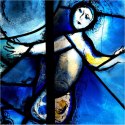
Download Study Card
It's been said that all the signs and wonders performed during the Exodus served two purposes: 1) to convince the Egyptians of the greatness of God, and 2) to convince the Israelites of the same thing...
May the LORD God of Israel help us live by true bittachon (בִּטָּחוֹן) - trusting in Him and rejoicing in His salvation. Amen.
Parashat Beshalach - בשלח

[ The following is related to this week's Torah reading (Beshalach). Please read the Torah portion to "find your place" here.]
01.29.12 (Shevat 5, 5772) The Torah reading for this week is parashat Beshalach, the fourth of the Book of Exodus. Here again we read about how the wicked Pharaoh hardened his heart by ordering his armies to pursue God's newly redeemed people. This resulted in further disaster for Egypt but great glory to the LORD God of Israel...
After the Israelites left Egypt, the LORD did not lead them along the most direct route to the land of Canaan (through territory occupied by the Philistines), but rather toward Yam Suf - the Sea of Reeds. The LORD led the way for the Israelites in a Pillar of Cloud (עַמּוּד עָנָן) by day and a Pillar of Fire (עַמּוּד אֵשׁ) by night, and had them "turn back" from Etham toward Egypt to encamp before Baal-Tzefon (בַּעַל צְפן) - an Egyptian idol - by the Red Sea, so that Pharaoh would be led to believe that the Israelites were lost in the wilderness (according to rabbinic literature, this idol - the only one that remained undestroyed after God sent the tenth plague upon Egypt - was intentionally spared by God in order to "bait" Pharaoh into thinking that the God of Israel was powerless over him).
When the Egyptian calvary caught up to them, the Israelites dramatically found themselves "between a rock and a hard place," with the sea on one side, and Pharaoh's menacing army on the other. God then moved the Pillar of Cloud so that it stood between the Egyptians and the Israelites. The Cloud grew black and the Egyptian cavalry could no longer see the Israelites. Meanwhile, a Pillar of Fire appeared in front of the people, lighting their way. Moses then raised his staff and a strong east wind blew and divided the waters, forming a wall of water on the right and left, and the Israelites began to cross safely.
According to Midrash, the sea formed a "tent" over the heads of the Israelites, protecting them on all sides. Moreover, the waters divided into twelve tunnels, one for each tribe. The walls of the water were perfectly clear, like translucent glass, so that the tribes could see one another as they crossed.... Another midrash says that all of the waters of the earth split at the same time as the Sea of Reeds - including rivers and lakes around the world.
At any rate, by daybreak all of the Israelites had safely reached the other side, and the Pillar of Cloud lifted. The Egyptians then began to follow in pursuit, but the ground beneath them turned to mud and the wheels of their chariots became stuck (this is considered retribution for forcing the Israelites to make bricks of mortar without straw). As the Egyptians attempted to retreat, Moses stretched out his staff and the wall of waters collapsed over them. The Israelites watched in awe as the waters engulfed all of Pharaoh's mightiest warriors. There were no survivors.
Overjoyed that they no longer need fear Pharaoh, the people began to cheer and rejoice. Then Moses composed a great song (Exod. 15), a spontaneous hymn of praise and thanks to the LORD for Israel's deliverance (the song opens with "I will sing..." and apparently will also be sung in the Heavenly Jerusalem: see Rev. 15:3). Miriam, Moses' sister led Israel in a dance of victory, "Sing to the LORD, for he has triumphed gloriously; the horse and his rider he has thrown into the sea."
Moses then led the people away from the sea, into the desert. After three days without finding water, the Israelites finally arrived at Marah ("bitter"), a place where the water was undrinkable. The people complained and Moses asked the LORD for help. The LORD then showed Moses a tree which he was to throw in the bitter waters. Miraculously, the water turned sweet so the people could drink.
In the second month of their travel through the desert, the matzah that the Israelites brought with them ran out. The people again began to complain to Moses. After Moses prayed, the LORD sent food from heaven - manna - which appeared as the morning dew every day (except for Shabbat). According to midrash, when Moses first instructed the people to gather a double portion on Friday to prepare for Shabbat, Dathan and Abiram wanted to prove him a liar and rose early Shabbat morning to secretly scatter manna on the ground. However, the birds came and ate it all up and when the Israelites went out to gather manna, they could not find any (an old custom in synagogue is to scatter bread on Shabbat Shirah, in memory of the birds). Another midrash says that the double portion of manna that fell on Friday had a better taste and smell than the manna that fell on the other days. It also would not rot like any leftover manna collected on other days. The manna was said to have had no taste, but was entirely a product of aroma (the Mem and Nun are both nasal letters in Hebrew): If a person was righteous, the food was said to taste heavenly, but if they were unbelieving or complaining, it was said to taste entirely bland.
As the people continued traveling through the desert, they arrived at Rephidim and complained that they were running out of water. Some even threatened to stone Moses to death. Moses then asked the LORD for help and was instructed to take the leaders outside the camp to watch him strike a rock with his staff (according to Midrash, God wanted witnesses to confirm that there had been no well there all along). When he did, fresh water flowed forth and the people were refreshed. The name of the place was called "Massah and Meribah" (מַסָּה וּמְרִיבָה) - "testing and arguing" - because there the Israelites tested God and argued with Moses.
The parashah ends with the unprovoked attack of a warlike and nomadic tribe called the Amalekites while Israel camped at Rephidim (Amalek may have been a grandson of Esau and chief of an Edomite tribe (Gen. 36:12, 16), though he is also described as "first among the nations," perhaps predating the time of Abraham (Gen. 14:7, Num. 24:20)). Joshua (יְהוֹשֻׁעַ), Moses' assistant, was put in charge of the defense of Israel. Moses ascended a hilltop with Aaron and Hur (thought by some to be Miriam's son from Caleb). As the battle raged, whenever Moses held up his hands, the Israelites prevailed, but when he tired, they began to lose. Aaron and Hur then had Moses sit down and held his arms up for him. By sunset, Joshua had defeated the Amalekite armies. The LORD then vowed to one day wipe out the descendants of Amalek. (To this day, the soferim blot out the name Amalek to test their quill before writing a Torah scroll, and the Amalekites are regarded as the perpetual enemies of Israel. Some regard Haman, Hitler, and other anti-Jewish people as "Amalekites"). Moses then built an altar he called Adonai Nissi (יהוה נִסִּי), "The LORD is my Standard (or Banner)," in commemoration of his raised arms as a sign for God's sustenance of Israel (note that "hand upon the throne (עַל־כֵּס)" [v. 17:16] could be rendered as "hand upon the standard" (עַל־נֵס) through copyist error).
 |
Shabbat Table Talk for Bo

[ The following is related to this week's Torah reading (Bo). Please read the Torah portion to "find your place" here.]
01.27.12 (Shevat 3, 5772) Last week's Torah portion (Va'era) reported how Pharaoh refused to listen to Moses' pleas for Israel's freedom, despite seven devastating plagues that came upon Egypt in God's Name (יהוה). In this week's portion (Bo), the battle between God and Pharaoh comes to a dramatic conclusion. The last three of the ten plagues are unleashed upon Egypt: a swarm of locusts devoured all the crops and greenery; a palpable darkness enveloped the land for three days; and all the firstborn of Egypt were killed at the stroke of midnight of the 15th of the month of Nisan...
Before the final plague, God instructed the Jewish people to establish a new calendar based on the sighting of the new moon of spring. On the tenth day of that month, God told the people to acquire a "Passover offering" to Him, namely an unblemished lamb (or goat), one for each household. On the 14th of that month ("between the evenings") the animal would be slaughtered and its blood sprinkled on the doorposts and lintel of every Israelite home, so that God would "pass over" these dwellings when He came to kill the Egyptian firstborn that night. The roasted meat of the offering was to be eaten that night with unleavened bread (matzah) and bitter herbs (maror). God then commanded the Israelites to observe a seven-day "festival of matzah" to commemorate the Exodus for all subsequent generations.
Just before the final plague was delivered, God instructed the Israelites to ask their Egyptian neighbors for gold, silver and jewelry, thereby plundering Egypt of its wealth. The death of the firstborn at last broke Pharaoh's resistance and he finally allowed the Israelites to depart from his land. Because they left in great haste there was no time for their dough to rise. The Torah states that there were 600,000 adult men who left Egypt, along with all the women, children, and a "mixed multitude" of non-Israelite slaves who tagged along with the Israelites.
The Israelites were commanded to consecrate all the firstborn to God and to commemorate the anniversary of the Exodus each year by celebrating the LORD's Passover in conjunction with the Feast of Unleavened Bread. During this time they were to remove all leaven from their homes for seven days, eat matzah, and retell the story of their redemption to their children. The portion ends with the commandment to wear tefillin (phylacteries) on the arm and head as a reminder of how the LORD saved the Israelites from their bondage in Egypt.
Torah Table Talk Page...
To help you discuss or study this Torah portion, I wrote a new Shabbat "Table Talk" for Parashat Bo. Like others you can find on this site, first I include a brief summary of the reading followed by a set of questions and answers. Hopefully this material will prompt some interesting discussion for your Sabbath. You can download the PDF file from the linked page (above) or by directly clicking here:
While driving today, I sensed some anxiety and began to pray. I then heard the Ruach HaKodesh whisper in my ear: "Peace - be still and know that I am God. Be not afraid; let not your heart be troubled; do not be anxious about anything... talk to Me, for I will listen and I care. Be not troubled: I give you My strength and My comfort. I am with you; I am your God; I love you with an everlasting love.... I am all your heart's desire; the pearl of great price you inwardly seek. Live in My love, and My love will live in you." (Ps. 46:10; Mt. 13:46; 14:27; Jn 14:1; 26-27; 15:1-5; Rev. 3:20; 1 Pet. 5:7; Phil 4:6; Isa. 41:10; Jer. 31:3). Shabbat Shalom, chaverim...
The Approaching Day...
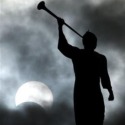
01.25.12 (Shevat 1, 5772) There have been various reports of eery and alarming "blasts" being sounded throughout the atmosphere of the earth recently, with various hypotheses offered by scientists regarding the phenomena (click here). Regardless of their natural cause, however, these blasts remind us of the coming day when God will sound the heavenly shofar and descend to judge the world (1 Thess. 4:16; Matt. 24:31; John 5:25; 1 Cor. 15:52). Indeed, the great "Day of the LORD" (יוֹם־יְהוָה) will be heralded by the sound of the great shofar, just as the prophet Jeremiah foresaw the doom that was coming to Judah and exclaimed: "My anguish, my anguish! I writhe in pain! Oh the walls of my heart! My heart is beating wildly; I cannot keep silent, for I hear the sound of the trumpet, the alarm of war. Crash follows hard on crash; the whole land is laid waste. Suddenly my tents are laid waste, my curtains in a moment. How long must I see the standard and hear the sound of the trumpet?" (Jer. 4:19-20). I set watchmen over you, saying, 'Pay attention to the sound of the trumpet!' But the people said, 'We will not pay attention.'
יְהוָה עֵינֶיךָ הֲלוֹא לֶאֱמוּנָה
הִכִּיתָה אתָם וְלא־חָלוּ
כִּלִּיתָם מֵאֲנוּ קַחַת מוּסָר
חִזְּקוּ פְנֵיהֶם מִסֶּלַע מֵאֲנוּ לָשׁוּב
Adonai · ei·ne·kha · ha·lo · le·e·mu·nah
hik·ki·tah · o·tam · ve·lo · cha·lu
kil·li·tam · me·a·nu · ka·chat · mu·sar
chiz·ze·ku · fe·nei·hem · mi·se·la · me·a·nu · la·shuv

"O LORD, do not your eyes look for faithfulness?
You have struck them down, but they felt no anguish;
You have consumed them, but they refused to take correction.
They made their faces harder than rock; they have refused to turn back to You."
(Jeremiah 5:3)
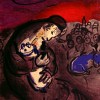
Eventually even the prophet's patience reached its limit. "To whom shall I speak and give warning, that they may hear? Behold, their ears are uncircumcised, they cannot listen; behold, the word of the LORD is to them an object of scorn; they take no pleasure in it. Therefore I am full of the wrath of the LORD; I am weary of holding it in. "Pour it out upon the children in the street, and upon the gatherings of young men, also; both husband and wife shall be taken, the elderly and the very aged" (Jer. 6:10-11). This is the time when the command "Let there be darkness" (וִיהִי חשֶׁךְ) is uttered from on High, a direct reversal of His very first recorded command, "Let there be light" (יְהִי אוֹר)...
"Because I have called and you refused to listen, have stretched out my hand and no one has heeded, because you have ignored all my counsel and would have none of my reproof, I also will laugh at your calamity; I will mock when terror strikes you, when terror strikes you like a storm and your calamity comes like a whirlwind, when distress and anguish come upon you. Then they will call upon me, but I will not answer; they will seek me diligently but will not find me. Because they hated knowledge and did not choose the fear of the LORD, would have none of my counsel and despised all my reproof, therefore they shall eat the fruit of their way, and have their fill of their own devices." - Prov. 1:21-31
There is an appeal to the faithful in the midst of all this, just as Israel found shelter in the land of Goshen when the judgments and great tribulation befell ancient Egypt. "Stand by the roads, and look, and ask for the ancient paths, where the good way is; and walk in it, and find rest for your souls" (Jer. 6:16). "For the 'simple' (פְּתָיִם) are killed by their turning away, and the smugness (or 'prosperity') of fools (כְּסִילִים) destroys them; but whoever listens to Me will dwell securely and will be at ease, without dread of disaster" (Prov. 31:32-33). Notice that "lady Wisdom" (חָכְמוֹת) continues to call out to the simple to "turn" to the LORD to find life and healing, and the rejection of her is the rejection of the LORD Himself (Prov. 1:7; 9:10; Psalm 110:10, etc.). When people refuse to turn to the only Wise God our Savior, they necessarily turn themselves over to tohu (chaos, vanity, and self-destruction).
כִּי מְשׁוּבַת פְּתָיִם תַּהַרְגֵם
וְשַׁלְוַת כְּסִילִים תְּאַבְּדֵם
וְשׁמֵעַ לִי יִשְׁכָּן־בֶּטַח
וְשַׁאֲנַן מִפַּחַד רָעָה
ki · me·shu·vat · pe·ta·yim · ta·har·gem
ve·shal·vat · ke·si·lim · te·a·be·dem
ve·sho·me·a · li · yish·kon · be·tach
ve·sha·a·nan · mi·pa·chad · ra·ah

"For the simple are killed by their turning away,
and the smugness (or 'prosperity') of fools destroys them;
but whoever listens to Me will dwell securely
and will be at ease without dread of disaster"
(Prov. 1:32-33)
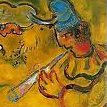
Yeshua routinely warned us of the danger of self-deception and unbelief. "Not everyone who says to me, 'Lord, Lord,' will enter the kingdom of heaven, but the one who does the will of my Father who is in heaven. On that day many will say to me, 'Lord, Lord, did we not prophesy in your Name, and cast out demons in your Name, and do many mighty works in your Name?' And then will I declare (i.e., ὁμολογήσω, "say the same thing") to them, 'I never knew you; depart from me, you workers of lawlessness' (lit., you deniers of the Torah; i.e., anomia, ἀνομία from α- + νομος, "without law") – Matt. 7:21-23. He also used the parable of the "wise and unwise builders" to urge His followers to make their habitation secure: "Everyone then who hears these words of mine and does them will be like a wise man who built his house on the rock. And the rain fell, and the floods came, and the winds blew and beat on that house, but it did not fall, because it had been founded on the rock. Everyone who hears these words of mine and does not do them will be like a foolish man who built his house on the sand. And the rain fell, and the floods came, and the winds blew and beat against that house, and it fell, and great was the fall of it" (Matt. 7:24-27).
God truly loves us, chaverim, but that means he loves us enough to discipline us for our good and for the glory of His holy Name. As C.S. Lewis once remarked, "God doesn't love you because you are good, but He will make you good because He loves you." He shows us a "severe mercy..." It is a fearful thing to fall into the hands of the Living God (אֱלהִים חַיִּים), though I would rather be corrected by our LORD than to be judged along with this world.
Finally, chaverim, we are not to live in fear or dread of God or to question His great love for us. God loves you and calls you to come to Him today for salvation and eternal life.... Recall the words of the prophet Samuel, who had rebuked Israel for requesting an earthly king instead of living under the direct Kingship of the LORD: "Do not be afraid; yes, you have done all this evil. Yet do not turn aside from following the LORD, but serve the LORD with all your heart. And do not turn aside after empty chaos (i.e., ha-tohu: הַתּהוּ) that cannot profit or deliver, for that is empty (כִּי־תהוּ הֵמָּה). For the LORD will not forsake his people, for the sake of (בַּעֲבוּר) his great name (שְׁמוֹ הַגָּדוֹל), because it has pleased the LORD to make you a people for himself. Moreover, as for me, far be it from me that I should sin against the LORD by ceasing to pray for you, and I will instruct you in the good and the right way. Only fear the LORD and serve him in the truth and with all your heart (בּאֱמֶת בְּכָל־לְבַבְכֶם). For consider what great things he has done for you" (1 Sam. 12:20-24).
Among other things, the message of the cross of Yeshua is precisely this: God helps those who can't help themselves... The heart of the Torah is the law of the Gospel, but real love is simply impossible apart from the miracle of God's grace....Thank God for salvation in Yeshua! Consider what great things He has done for you - and draw near to Him today... Shalom.
 |
Everlasting Consolation

01.24.12 (Tevet 29, 5772) The nations of this world are reckoned as less than nothing; their glory is "tohu" (תהוּ) - confusion and unreality - and their princes are regarded as utter vanity. "Scarcely are they planted and have taken root when He blows upon them and they wither to become dust carried off by the storming winds" (Isa. 40:24). The nations of the earth are dried grasses; the kings of the earth are withered flowers; they shall all be blown away like chaff driven by the wind...
But the LORD is incomparably great and will fulfill his manifold promises to Israel. Verily God will one day establish Zion upon the earth: "The grass withers, the flower fades, but the Word of our God will stand forever" (Isa. 40:8). He created the heavens and calls each star by name. He is invincible in power and no one can overrule His will.
יָבֵשׁ חָצִיר נָבֵל צִיץ
וּדְבַר־אֱלהֵינוּ יָקוּם לְעוֹלָם
ya·vesh · cha·tzir · na·vel · tzitz
u·de·var · E·lo·hei·nu · ya·kum · le·o·lam

"The grass withers, the flower fades,
but the word of our God will stand forever."
(Isa. 40:8)

Hebrew Study Card
God is the only enduring Reality in a constantly changing world, and He has designed it this way to cause men's hearts to search for him. "All flesh is grass, and all its beauty is like the flower of the field" - such is the condition of this ephemeral world with its flux and fortunes. The flesh fades because the breath of the LORD blows (רוּחַ יְהוָה נָשְׁבָה) upon it (Isa. 40:7). God Himself has ordained human life to be a vapor....
Nonetheless, despite the inescapable dissolution of the flesh in this world, we are told not to fear, because there is good news for Zion: the LORD is coming with might to reward those who are waiting for him. He will tend his flock like a shepherd; he will gather his lambs and carry them close to his heart (Isa. 40:11). As the apostle Peter said, this good news is the eternal life given through the imperishable "seed" - the Word of God that rises forever in Yeshua (1 Pet. 1:23-25).
This world is not our home; we are "strangers" here. It is an affliction to wait for the LORD, a sort of "homesickness" of heart... The apostle Paul says our loneliness and alienation prepare for us an "eternal weight of glory" beyond all comparison, because we are not looking at what can be seen but at what cannot be seen. "For what can be seen is temporary, but what cannot be seen is eternal" (2 Cor. 4:17-18). Just as the "two-souled" man is unstable in all his ways, so the process of being "educated for eternity" means learning to focus our heart's passion and hope on the glory of heaven. "For where your treasure is, there will your heart be also."
Those who wait for the LORD inwardly groan to be clothed with immortality and eternal life, and their consolation is great indeed. Yeshua is "preparing a place for you," an everlasting place of refuge whose builder and maker is God (Heb. 11:10). Faith sees beyond the shadows of this world to behold your true home with your Heavenly Father.
 |
Let there be Darkness...

[ The following is related to this week's Torah reading (Bo). Please read the Torah portion to "find your place" here.]
01.24.12 (Tevet 29, 5772) Unlike the previous eight plagues, the ninth plague (darkness) did not cause physical damage but rather blinded and immobilized the Egyptians (Exod. 10:22-23). A question arose among the sages as to the nature of this darkness. Did the plague of darkness come as a consequence of God's Presence drawing near to Egypt (i.e., the 'darkness on high'), or was it the result of His Presence being removed (i.e., the 'darkness of hell')? In other words, did God cause the darkness to come or did He only permit the forces of chaos - the powers of hell - to be unleashed for a season?
The following quote comes from Shemot Rabbah 14:
"Stretch out your hand toward heaven and let there be darkness" (Exod. 10:21). Whence did this darkness come? Rabbi Judah and Rabbi Nehemiah discussed the question. Rabbi Judah said, 'From the darkness on high, as it was said: 'He made darkness his hiding place' (Psalm 18:12). Rabbi Nehemiah said, 'From the darkness of hell. As it is said, 'A land of thick darkness, as darkness itself' (Job 10:22).
The first kind of darkness (the 'darkness on high') represents a "cloud of unknowing," a sort of holy darkness that surrounds the glory of God. We are incapable of penetrating this darkness not only because of sin but because we are finite and limited creatures. God is infinite and therefore inherently unknowable, at least regarding His inner life and essence, and some things about Him we will never understand or know (Isa. 55:8-9). Moses was able to "draw near to the thick darkness" on Sinai, though he only saw visions and patterns of the divine realm: he could not directly see the "face" of God and live (Exod. 33:20). As the psalmist said, יָשֶׁת חשֶׁךְ סִתְרוֹ / yashet choshekh sitro: "He puts darkness as His secret place" (Psalm 18:11). As Moses himself later wrote: הַנִּסְתָּרת לַיהוָה אֱלהֵינוּ / ha-nistarot la-Adonai Eloheinu: "the secret things belong to the LORD our God" (Deut. 29:29).
The second kind of darkness is the absence of the constraining power of light. It suggests God removing His protection and care, which allowed the powers of hell to be unleashed for a season. Such darkness symbolizes intellectual, moral, or spiritual incomprehension. "They did not see one another, nor did anyone rise from his place for three days..." (Exod. 10:23).
Perhaps the answer to the original question is both: God both drew near and God withdrew from Egypt. Though He indeed fills the heaven and the earth, the LORD is both a "God who is near" (קָרוֹב) and a "God who is far" (רָחוֹק) (Jer. 23:23-24). To those who welcome Him, the LORD gives light and freedom, but to those who recoil from Him, the LORD is a blinding power that immobilizes. While Egypt was covered in darkness for three days, "all the children of Israel had light in their dwellings" (Exod. 10:23).
יוֹצֵר אוֹר וּבוֹרֵא חשֶׁךְ
עשֶׂה שָׁלוֹם וּבוֹרֵא רָע
אֲנִי יהוה עשֶׂה כָל־אֵלֶּה
yo·tzeir · ohr · u·vo·rei · cho·shekh
o·seh · sha·lom · u·vo·rei · ra
a·ni · Adonai · o·seh · khol · el·leh

I form light and create darkness,
I make peace and create evil;
I the LORD do all these things.
(Isa. 45:7)
Regardless of how we might try to understand this paradox, it is clear that the moral and spiritual depravity of Egypt was so great that God judged the "world below" with the divine command: "Let there be darkness" (וִיהִי חשֶׁךְ) - a direct reversal of His very first recorded command, "Let there be light" (יְהִי אוֹר). The absence of the Divine Light suggests a hellish gloom, a realm entirely devoid of God's presence, the chaos of the world before God began fashioning it (Gen. 1:2).
This is not unlike the political conditions that appear to be operating in the world today. Modern day America has become a place of untold depravity and corruption, with moral and spiritual blindness in "high places." Whenever the leaders of nations attempt to usurp the authority of God and enslave people, judgment from heaven is imminent: "Let there be darkness..." Among the nations, blindness and apostasy are ubiquitous. Collectively, the powers of the world speak as Pharaoh of old: "Who is the LORD that I should obey His voice?" (Exod. 5:2). As it is written: "The kings of the earth station themselves, and the rulers take counsel against the LORD, and against His Mashiach, saying, 'Let us break the cords of their yoke and shake off their ropes from us'" (Psalm 2:2). Regarding the realm of the Spirit, dwelling in spiritual darkness is ultimately a moral choice: "And this is the judgment: the light has come into the world, and people loved the darkness more than the light, because their works were evil" (John 3:19). A future time of catastrophic and worldwide judgment is appointed for the End of Days. This time is drawing near, and for all the more reason we should appeal to the LORD God of Israel to preserve us as He did Israel in the land of Goshen. May the LORD help us all abide in His light, until our change finally comes (Job 14:14).
מִגְדַּל־עז שֵׁם יהוה בּוֹ־יָרוּץ צַדִּיק וְנִשְׂגָּב
mig·dal · oz · shem · Adonai · bo · ya·rutz · tzad·dik · ve·nis·gav

"The Name of the LORD is a tower of strength;
the righteous one runs into it and is lifted up" (Prov. 18:10)
Download Study Card
Note: I mentioned the other day that the NT Greek word for "authority" (ἐξουσία) means exercising the grace to call out to God to manifest real change in this world... The Name of the LORD (שֵׁם יְהוָה) is not merely a cognitive or linguistic matter, but rather one of absolute spiritual "dynamite" and hallowed strength... The parochet (veil of separation) has been rent asunder, and we can now boldly lift up our hearts before the Throne of Grace (כִּסֵּא הֶחָסֶד) to find help for our need (Heb. 4:16).
Personal Update: Please keep this ministry in your prayers, chaverim, and in particular pray for me (John), that I would serve the LORD with all my heart, soul, mind, and strength, and that I would be a good husband and a patient father.... Also please ask God that I would have the health, the strength, the wisdom and the grace to do this work for the upbuilding of His children for the praise of Yeshua our LORD. Thank you so much....
Rosh Chodesh Shevat

[ Teusday, January 24th (after sundown) is Rosh Chodesh Shevat, the start of the eleventh month of the Jewish calendar... ]
01.23.12 (Tevet 28, 5772) The Hebrew month of Shevat (חדש שבט) is the eleventh month of the Jewish calendar (counting from the month of Nisan). The name "Shevat" (שְׁבָט) was adopted by the Jewish people sometime during the Babylonian exile, though it is explicitly mentioned in the Scriptures:
On the twenty-fourth day of the eleventh month (בְּעַשְׁתֵּי־עָשָׂר חדֶשׁ), which is the month of Shevat (חדֶשׁ שְׁבָט), in the second year of Darius, the word of the LORD came to the prophet Zechariah... (Zech. 1:7)
The month of Shevat is considered important since the Scriptures state that Moses began his summary of the Torah (i.e., Mishneh Torah, or the sermon recorded in Book of Deuteronomy) on the first day of this month:
"These are the words that Moses spoke to all Israel beyond the Jordan in the wilderness ... in the fortieth year, on the first day of the eleventh month [i.e., Shevat] (בְּעַשְׁתֵּי־עָשָׂר חדֶשׁ)" (Deut. 1:1,3)
Because of this, the sages have long associated the 1st of Shevat with the holiday of Shavuot (i.e., the sixth of Sivan), since on both these dates God appealed to Israel to receive the message of the Torah. Moreover, since Jewish tradition says that Moses preached the contents of Deuteronomy for 37 days, the month of Shevat (which lasts 30 days) until Adar 7 is considered an opportune time to renew your study of the Torah.
Perhaps in connection with this, the month of Shevat is primarily associated with the holiday of Tu B'Shevat, the "Rosh Hashanah" (New Year) for trees, in which we thank God for the fruit that He provides our lives. Tu B'Shevat occurs during the full moon, on the 15th of the Hebrew month (this year, Wed., February 8th at sundown).
Rosh Chodesh Blessing:
The following (simplified) blessing can be recited to ask the LORD to help you and your family for the coming new month:
יְהִי רָצוֹן מִלְּפָנֵיךָ יהוה אֱלהֵינוּ וֵאלהֵי אֲבוֹתֵינוּ
שֶׁתְּחַדֵּשׁ עָלֵינוּ חדֶשׁ טוֹב בַּאֲדנֵינוּ יֵשׁוּעַ הַמָּשִׁיחַ אָמֵן
ye·hi · ra·tzon · mil·fa·ne·kha · Adonai · E·lo·hei·nu · ve·lo·hei · a·vo·tei·nu
she·te·cha·desh · a·lei·nu · cho·desh · tov · ba'a·do·nei·nu · Ye·shu·a · ha·ma·shi·ach · A·men

"May it be Your will, LORD our God and God of our fathers,
that you renew for us a good month in our Lord Yeshua the Messiah. Amen."

Download Study Card
Parashat Bo - בא

[ The following is related to this week's Torah reading (Bo). Please read the Torah portion to "find your place" here.]
01.22.12 (Tevet 27, 5772) The Torah reading for this week is parashat Bo, the third of the Book of Exodus. In this portion of Torah, we arrive at the glorious conclusion of the LORD's campaign to free Israel from bondage in Egypt. Immediately following the description of ninth plague (i.e., the plague of darkness), the redemptive sacrifice of the Passover lamb (קָרְבָּן פֶּסַה) is explained. The Jewish people were saved by the blood of the lamb, just as today we call upon Yeshua as the Lamb of God. Notice that the word בּא ("go") and פרעה ("Pharoah") together equal the gematria of משׁיח ("mashiach"), providing a hint of the Messianic redemption that was foreshadowed in Egypt. Every jot and tittle...
The story of Yetziat Mitzraim (the Exodus from Egypt) is to be retold to every generation, and its lessons are to be applied to every age and place. Hence the Passover Seder and its focus on the needs of children. The Hebrew word for "education" is chinukh, a word that shares the same root as the word "chanukah" (חֲנֻכָּה, dedication). We "tell the story so that we may know" that the LORD is God (Exod. 10:2). Education is ultimately devotional. God called the people of Israel to cleave to Him and walk in His ways....
The first commandment given to the nation of Israel (as opposed to patriarchs or individual leaders such as Moses and Aaron) was that of Rosh Chodashim (i.e., the Biblical New Year that begins on the first new moon of spring). "This month shall be the beginning of months for you" / הַחדֶשׁ הַזֶּה לָכֶם ראשׁ חֳדָשִׁים (Exod. 12:2). Our corporate identity therefore begins with a shared consciousness of time from a Divine perspective. The mo'edim (festivals of the LORD) all are reckoned based on the sacred calendar given to the redeemed Israelite nation. As it is also written in the Book of Psalms: "He made the moon for the appointed times" / עָשָׂה יָרֵחַ לְמוֹעֲדִים (Psalm 104:19). Undoubtedly Yeshua followed this calendar, as did His first followers (Gal. 4:4).
Parashat Bo begins with the LORD commanding Moses to go (bo) before Pharaoh to announce further apocalyptic judgments upon Egypt. The purpose of this power encounter was to vindicate God's justice and power (deliverance/salvation) by overthrowing the tyranny of unjust human oppression. Pharaoh's nightmare of "one little lamb" outweighing all the firstborn of Egypt was to be fulfilled.

According to midrash, the plague of darkness (i.e, the last plague before the death of the firstborn) lasted six days (as opposed to the usual seven days). During the first three days, the land was dark and it was difficult to breathe. The stars were not visible. During the last three days, the darkness became "thick" and severe. If a person were sitting, he couldn't stand up, and it he were standing, he couldn't sit down. Many "Egyptianized" Israelites who did not want to escape from Egypt with their brothers also died during this plague. Why not seven days of plague, like the previous judgments? The seventh day was reserved for the time when the Egyptians pursued the Israelites at the Sea of Reeds....
Before the LORD administered the final plague - the dreaded makat bechorot (death of the firstborn) - he instructed Moses to "please ask (דַּבֶּר־נָא) the Israelites to borrow from the Egyptians gold and silver..." (Exod. 11:2). According to the sages, this request was made so that God's promise made to Abraham would be fulfilled (i.e., that his descendants would escape from their bondage and afterwards come out with great possessions (Gen. 15:13-14)). According to midrash, when Moses announced the final plague, all the firstborn of Egypt gathered and demanded that the Israelites be set free. "Let the people go, for all that Moses speaks is fulfilled." The firstborn then began striking their fathers and took their jewels, silver, gold, etc. -- which they then entrusted to Moses. On the night they were killed by the plague, Moses was left with their wealth. The booty taken by the Israelites was regarded as "uncollected wages" for the hundreds of years of forced labor and cruel bondage (not to mention for the services of Joseph, whose ingenuity brought the world's wealth to Egypt in the first place).
The blood of the korban Pesach (קָרְבָּן פֶּסַה) - the Passover lamb - was to be smeared on the two sides and top of the doorway, resembling the shape of the letter Chet. This letter, signifying the number 8, is connected with the word חי (chai), short for chayim (life). The blood of the lamb (דַּם הַשֶּׂה) not only saves from the judgment of death, but also is a symbol of divine life:

At the very moment when God "passed over" the houses of the Israelites, all the idols of the Egyptians were destroyed. According to the Zohar, the Passover lamb was intended to demonstrate the inadequacy of the Egyptian sheep god (Khnum). The bones of the sacrificed lamb were to be left unbroken and then thrown outside. The Egyptians would then see the bones of their "god" being chewed by dogs....
The Kingdom of Heaven is not the same as the kingdom of man. Judgment is coming upon the world, as it was in the days of Pharaoh. It's just a matter of time... The greater question is whether you are accounted as part of redeemed Israel or as part of the corrupt world system...
Shabbat Table Talk for Va'era

[ The following entry is related to this week's Torah reading (Va'era). Please read the Torah portion to "find your place" here. ]
01.20.12 (Tevet 25, 5772) When Pharaoh refused to let the people journey to the wilderness to worship the LORD, the "showdown" between the kingdom of man and the kingdom of God began. In the first exchange, Aaron's staff turned into a snake that swallowed the staffs of the Egyptian sorcerers without a trace. Nonetheless, Pharaoh "hardened his heart" and refused to let the Israelites go. God then began sending an increasingly severe series of plagues upon the Egyptians. First the waters of the Nile river were turned to blood; then swarms of frogs began to overrun the land. Lice then came up from the dust, followed by swarms of noxious creatures. Pestilence began killing the domestic animals while painful boils afflicted the Egyptians. For the seventh plague, God sent hail of "fire and ice" from the heavens that devastated much of the land. Despite all this, the Pharaoh still refused to relent, so God "hardened" his heart so that the final plagues upon Egypt would commence.
To help you discuss or study this Torah portion, I wrote a new Shabbat "Table Talk" for Parashat Va'era. Like others you can find on this site, first I include a brief summary of the reading followed by a set of questions and answers. Hopefully this material will prompt some interesting discussion for your Sabbath. You can download the PDF file from the linked page (above) or by directly clicking here:
Shabbat Shalom, chaverim! May you feast on the good word of the LORD our God, the joy and delight of our hearts:
נִמְצְאוּ דְבָרֶיךָ וָאכְלֵם
וַיְהִי דְבָרֶיךָ לִי לְשָׂשׂוֹן וּלְשִׂמְחַת לְבָבִי
כִּי־נִקְרָא שִׁמְךָ עָלַי יְהוָה אֱלהֵי צְבָאוֹת
nim·tze·u · de·va·re·kha · va·o·khe·lem
vai·hi · de·va·re·kha · li · le·sas·son · ul·sim·chat · le·va·vi
ki · nik·ra · shim·kha · a·lai · Adonai · e·lo·hei · tze·va·ot

"Your words were found, and I ate them,
and your words became to me a joy and the delight of my heart,
for I am called by your Name, O LORD, God of hosts."
(Jer. 15:16)

The Importance of Torah...

01.20.12 (Tevet 25, 5772) How wonderful is the Torah, chaverim; how precious and how important! For the Torah provides us with the groundwork and context for understanding the ministry of Yeshua and the revelation of the New Covenant. Indeed, could we even begin to understand the message of the New Testament apart from the Torah of Moses? For instance, consider how the story of the Exodus from Egypt provides the thematic narrative by which we understand the redemption given in Yeshua our Savior, the true "Lamb of God" (שֵׂה הָאֱלהִים). The people of Israel were enslaved by an evil power that ruled the world, but God heard their cry and graciously descended from heaven to deliver them by great acts of power and signs and wonders... God judged the evil accuser (satan) and rescued his children from cruel bondage. He saved them from death by the sacrificial blood of the lamb... This event marked a new beginning, a "new birth," and a new identity as God's chosen children. As "new creations," they would assume new responsibilities, since their Heavenly Father wanted his children to understand His holy character and will (i.e., the revelation of the various moral, social, and ethic laws given at Sinai). The climax of revelation, however, was given in the vision of the Throne of God and the need for blood atonement before it upon the altar (i.e., the revelation of the Tabernacle, its furnishings, and the laws of sacrifice). Ultimately, then, the Exodus from Egypt is a grand "parable" of the redemption that was to come in Yeshua, and indeed the Torah of Moses foretells of this greater deliverance. Yeshua is the inner meaning, the Substance, and the Living Voice of the Torah of Almighty God, the LORD of all...
מָה־אָהַבְתִּי תוֹרָתֶךָ
כָּל־הַיּוֹם הִיא שִׂיחָתִי
mah · a·hav·ti · to·ra·te·kha
kol · ha·yom · hi · si·cha·ti

"O how I love your Torah!
It is my meditation all the day long"
(Psalm 119:97)

Download Study Card
Notice that the Hebrew word translated "my meditation" (שׂיחָתִ) comes from a verb that means "to go over in one's mind." In Proverbs 6:20-22 the same word is used to refer to the inward voice heard by a son who has bound his parent's teachings to his heart: "When you walk, they will lead you; when you lie down, they will watch over you; and when you awake, they will talk with you (תְשִׂיחֶךָ)." Because God the Father loves us and gives the Holy Spirit to those who are trusting in His Son for the direction of life, we likewise are moved to meditate on Torah so that our Father's commandment is being written upon our hearts. In this way, wherever you go, your Heavenly Father's words "will lead you; when you lie down, they will watch over you; and when you awake, they will talk with you..."
Many are familiar with the passage: "All Scripture is breathed out by God (θεόπνευστος) and profitable for teaching, for reproof, for correction, and for training in righteousness, that the man of God may be complete, equipped for every good work" (2 Tim. 3:16-17), but many in the "church world" seem to forget that this refers to the Torah (i.e., "Old Testament"), since the New Testament had not yet been compiled when Paul wrote these words... The events recorded in the Torah illuminate our relationship with Yeshua, as He clearly explained to His disciples (Luke 24:27). Yeshua was the "Voice of the LORD" that spoke from the midst of the burning bush to Moses, just as He was the Voice that thundered at Sinai. The Torah is a great gift to us since it gives us the framework by which we are able to discern the substance of the New Testament: "Now all these things happened to them as examples (τύποι), but they were written down for our instruction, on whom the end of the ages has come" (1 Cor. 10:11). The Torah foreshadows the Substance, just as the Substance informs its shadow. We understand the shadow when we behold the Substance... Yeshua is the central Substance of the Torah, the "Key" that unlocks its true meaning and purpose, the essential piece of the puzzle that discloses the hidden image, though of course this could not be known apart from discovering His Silhouette revealed therein. "In the beginning was the Word..." (John 1:1).
בְּרֵאשִׁית הָיָה הַדָּבָר
וְהַדָּבָר הָיָה אֵת הָאֱלהִים
וֵאלהִים הָיָה הַדָּבָר
וְהַדָּבָר נִהְיָה בָשָׂר
וַיִּשְׁכּן בְּתוֹכֵנוּ וַנֶּחֱזֶה כְבוֹדוֹ
כִּכְבוֹד בֵּן יָחִיד לְאָבִיו
רַב־חֶסֶד וֶאֱמֶת
be·re·shit · ha·yah · ha·da·var
ve·ha·da·var · ha·yah · et · ha·e·lo·him
ve·lo·him · ha·yah · ha·da·var
ve·ha·da·var · nih·yah · va·sar
vai·yish·kon · be·to·khei·nu · va·ne·che·zeh · khe·vo·do
ki·khe·vod · ben · ya·chid · le·a·viv
rav · che·sed · ve·e·met

"In the beginning was the Word,
and the Word was with God,
and the Word was God.
... And the Word became flesh
and dwelt among us, and we have seen his glory,
the glory as of the only Son from the Father,
full of love and truth."
(John 1:1,14)

᾽Εν ἀρχῇ ἦν ὁ λόγος,
καὶ ὁ λόγος ἦν πρὸς τὸν θεόν,
καὶ θεὸς ἦν ὁ λόγος…
Καὶ ὁ λόγος σὰρξ ἐγένετο,
καὶ ἐσκήνωσεν ἐν ἡμῖν-
καὶ ἐθεασάμεθα τὴν δόξαν αὐτοῦ,
δόξαν ὡς μονογενοῦς παρὰ πατρός-
πλήρης χάριτος καὶ ἀληθείας

A Heart of Stone...
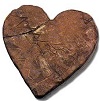
[ The following entry is related to this week's Torah reading (Va'era). Please read the Torah portion to "find your place" here. ]
01.19.12 (Tevet 24, 5772) Why did God harden Pharaoh's heart so that he would not let the Israelites go? So that God could multiply His signs and wonders in order to reveal to all the world that He was God (Exod. 7:3). But if God made him stubborn, how could Pharaoh be held responsible for his actions? Because God hardened his heart only after the despot had callously (i.e., heartlessly) refused the message of the first five plagues (Exod. 7:22, 8:15, 8:19, 8:32, 9:7). After the sixth plague, however, the Torah reads, "And the LORD hardened (i.e., "strengthened") Pharaoh's heart," by making it even more resolute, determined, and unyielding (Exod. 9:12). One sin leads to another... If someone repeatedly turns their heart to stone, the Lord may eventually ratify their decision by saying, "Have it your way..." (see Paul in Rom. 9:17-ff).
Note: For more on this subect, see the article, "Hardening of Heart," which was something I originally wrote for parashat Bo (next week), though it applies to Va'era as well...
 |
Moses' Thorn in the flesh...
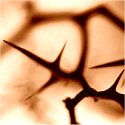
[ The following entry is related to this week's Torah reading (Va'era). Please read the Torah portion to "find your place" here. ]
01.19.12 (Tevet 24, 5772) According to midrash (Shemot Rabbah), as a very young lad Moses was once seen throwing Pharaoh's gold crown to the ground. Upon learning of this apparent act of insolence, Pharaoh devised a test to see if the child understood what he was doing. He therefore commanded that a platter with a piece of gold and a glowing piece of coal were to be presented before Moses and ordered the little boy to choose one. If Moses chose the gold, it would imply that he understood its value, and therefore he would be killed. On the other hand, if Moses chose the burning coal, he would be spared since he was unable to differentiate between gold and a glowing piece of coal. Moses began to reach out for the gold when an angel pushed his hand aside and he grabbed the coal instead. He then immediately put his hand in his mouth, but that burned his lips and tongue so badly that he had a permanent speech impediment as a result.
Later, when God commissioned Moses to speak to the children of Israel, he protested to the LORD that he was "heavy of mouth and heavy of tongue" (i.e., kevad peh ve'kaved lashon: כְּבַד־פֶּה וּכְבַד לָשׁוֹן) and therefore was unable to eloquently speak on behalf of the LORD to Pharaoh (Exod. 4:10). But the LORD said to him, "Who has made man's mouth? Who makes him mute, or deaf, or seeing, or blind? Is it not I, the LORD? Now therefore go, and I will be with your mouth and teach you what you shall speak" (Exod. 4:11-12).
Later, when the time came for Moses to actually go before Pharaoh to declare God's message to let the Israelites go, he again protested to the LORD that he was a man of "uncircumcised lips" (עֲרַל שְׂפָתָיִם), an idiom that meant that he regarded his lips to be of no acceptable use to God. (Ironically the prophet Isaiah later had his lips burned to purify them to speak on behalf of God; Isa. 6:6-7). In this connection it is interesting to ask why God did not simply heal Moses of his impairment. After all, the LORD had earlier told him that He had the power to make the blind to see, the deaf to hear, and the mute to speak...
According to many of the classical Jewish commentators, God did not cure Moses of his stuttering because He wanted the Israelites to know that he was a divine messenger. When he spoke in the Name of the LORD, the stuttering entirely disappeared and Moses spoke with fluent ease. This was to teach the people not to trust in human oratory or wisdom, but rather in the power of God (see 1 Cor. 2:1-5). Just as the Apostle Paul, the "Moses of the New Covenant," was given a "thorn in the flesh" (σκόλοψ τῇ σαρκί) to keep him humbly relying upon God for his sufficiency to serve (2 Cor. 12:7-10), so Moses was rendered entirely dependent upon the LORD but thereby became a "man of words" who spoke with "circumcised lips."
"O LORD, you will establish peace for us, for You have indeed done for us all our works" (Isa. 26:12). We must always remember that God does the work "for us" (לָּנוּ) and we are His witnesses. Salvation is "of the LORD," and is not the result of our own efforts. Anything of eternal value comes from God alone, who is the beginning and end of grace. "Not by (human) might, nor by (human) power, but by my Spirit, says the LORD of hosts (Zech. 4:6).
 |
It Begins with Blood...

[ The following entry is related to this week's Torah reading (Va'era). Please read the Torah portion to "find your place" here. ]
01.19.12 (Tevet 24, 5772) Regarding the first plague (i.e., makat-ha'dam: מַכַּת־הַדָּם) as described in Exodus 7:14-25, we may ask: Why were the waters of the Nile river turned into blood? Because God made all the blood of the innocent babies murdered there visible before the eyes of the people of Egypt, who regarded the river as "divine." That the fish also died shows the depth of the blood - that it was more than surface deep. Indeed the whole land was filled with blood. Jars of food were polluted with blood, the Egyptians walked around and their clothing was soiled with blood, etc. The Israelites still had ample supplies of fresh, pure water, but when the Egyptians forced them to give them some, as soon as it touched their lips it would turn to blood. Finally the Egyptians had no choice but to buy water from the Israelites so they could drink.
So you can see that the judgment of God began because of the murder of babies, whose blood cried out to Him from their watery grave. Indeed, one way to discern whether a nation will come under judgment from heaven is to see how the people there treat their most vulnerable members - the children, the elderly, the infirm, etc. Those nations that despise the weak and needy are slated for destruction....
 |
God Welcomes Sinners

01.19.12 (Tevet 24, 5772) How do we get "right" with God? How do we find His approval? The Hebrew word teshuvah (תְּשׁוּבָה) is often translated as "repentance," though it's more accurately understood as turning back (shuv) to God. In Modern Hebrew teshuvah means an "answer" to a shelah, or a question. God's love for us is the question, and our teshuvah – our turning of the heart toward Him – is the answer. Teshuvah is one of the greatest gifts God gives each of us – the ability to turn back to Him and seek healing for our brokenness.
דִּרְשׁוּ יְהוָה בְּהִמָּצְאוֹ קְרָאֻהוּ בִּהְיוֹתוֹ קָרוֹב
יַעֲזב רָשָׁע דַּרְכּוֹ וְאִישׁ אָוֶן מַחְשְׁבתָיו
וְיָשׁב אֶל־יְהוָה וִירַחֲמֵהוּ
וְאֶל־אֱלהֵינוּ כִּי־יַרְבֶּה לִסְלוֹחַ
dir·shu · Adonai · be·him·ma·tzo, · ke·ra·u·hu · bih·yo·to · ka·rov
ya·a·zov · ra·sha · dar·ko, · ve·ish · a·ven · mach·she·vo·tav
ve·ya·sho · el · Adonai · vi·ra·cha·me·hu
ve·el · E·lo·he·nu · ki · yar·beh · lis·lo·ach

"Seek the LORD while he may be found; call upon him while he is near;
let the wicked forsake his way, and the perverse man his thoughts;
let him return to the LORD, that he may have compassion on him,
and to our God, for he will abundantly forgive."
(Isa. 55:6-7)
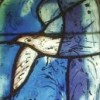
Please take a moment to let these words penetrate your heart... God is extending to you an personal invitation to seek Him and call upon His Name. This is not a demand to stand before Him in judgment, since the invitation is explicitly directed to the sinner: "Let the wicked man (i.e., rasha: רָשָׁע) forsake his way, and the perverted man (i.e., ish avon: אִישׁ אָוֶן) his thoughts; and let him return (i.e., shuv: שׁוּב) to the LORD, that He may have compassion (i.e., rachamim: רַחֲמִים) on him, and to our God, for he will abundantly forgive." God's calls you to receive His compassion, His love, and His forgiveness...
The invitation of divine grace is offensive to forms of worldly religion based on personal merit and the supposed ability of human beings to flatter blessings from Heaven... Nearly all "karma-based" religions of the world are scandalized and offended by God's unconditional love for the unworthy and helpless sinner. For them, God's love is conditional, based as it is on the observance of certain religious rituals, adhering to certain rules, and playing the approved "language game" (creeds, confessions, etc.). Legalism always attempts to find the "key" to open the door into the Presence of God through various forms of self effort ("don't touch this," "don't eat that," etc. Col. 2:20-23). It's underlying hope is that if I do such and such (or abstain from such and so), God will be propitiated and I will be accepted. It is therefore a mode of relating to God based on His conditional acceptance and approval....
But it is faith that provides the key that opens the door to true freedom. Faith is the miracle that makes blind eyes see (John 9:38-39). When we truly "live in the Presence of the LORD" by faith, we are set free from the trap of legalism. We receive the love of God; we accept that we are accepted; and then we walk in God's zealous care for our souls. We do not relate to God as our Judge but as our Heavenly Father, our Abba, our loving Savior:
"For my thoughts (מַחְשְׁבוֹתַי) are not your thoughts, neither are your ways my ways (דְּרָכָי), declares the LORD. For as the heavens are higher than the earth, so are my ways higher than your ways and my thoughts than your thoughts. For as the rain and the snow come down from heaven and do not return there but water the earth, making it bring forth and sprout, giving seed to the sower and bread to the eater, so shall my word (דָּבָר) be that goes out from my mouth; it shall not return to me empty, but it shall accomplish that which I purpose, and shall succeed in the thing for which I sent it. For you shall go out in joy and be led forth in peace; the mountains and the hills before you shall break forth into singing, and all the trees of the field shall clap their hands" (Isa. 55:8-12).
The religious leaders of Yeshua's day were offended because he "welcomed sinners" and enjoyed eating meals with them (Luke 15:2). From the perspective of the "holier-than-thou" Pharisees, befriending a sinner was downright scandalous. Such is the hidden sickness lurking within man's theological systems... We can almost hear their disapproving whispers and their dismissive accusations: "How could a good Jew behave like this? Does he not understand the call to personal holiness? Does he not know the Torah of "clean" and "unclean"? If a man is known by the company he keeps, we know enough about Yeshua to know that he's not truly pious..." And to this very day the self-righteous find offensive the idea that God welcomes the sinful, the needy, the broken, the despised, and the "outsider" into His presence... As Yeshua said, "those who are well have no need of a physician," and indeed offering them God's cure will always be regarded as a kind of poison...
As the parable of the prodigal son reveals, the self-righteous person frowns over the salvation of the unworthy. In effect, such a heart attitude holds God's love and grace for sinners in contempt... We must be careful here, since disapproving of God's acceptance for someone else may station you as an outsider to the Father's heart. O thank God that He welcomes sinners like us to return to Him!
Dietrich Bonhoeffer (1906–1945) tells the story about how a teacher once humiliated one of her students by standing him up in front of the class to ask whether his father -- notoriously known as the town drunk -- had been out drinking the night before. The little boy knew the accusation was true but bravely announced "No." When the teacher mockingly asked him again, pressing him for "the truth," the boy was adamant: "NO!" he yelled out. Bonhoeffer's comment was that this little boy spoke more truth by his lie than if he had merely reported the "facts" to the class -- and thereby betrayed the dignity of his father... In other words, there can be "truth" that is not truthful, "goodness" that is not really good, and "righteousness" that is not really right...
When Adam sinned against God, the LORD called out to him, "Where are you?" This was not a question asked for God's benefit, but for man's.... Likewise when the prodigal son "came to himself" and realized where he was, he made the decision to return back home (Luke 15:17). We all must "come to ourselves," realize the truth about our inward condition, and turn back to the LORD for healing and life. After returning, the father of the prodigal son did not wait to hear the son's confession of his numerous sins; no, he immediately ordered him to be clothed as a prince who had returned back to his proper place in the household of the king... He rejoiced because his beloved son - who had been taken captive by the world and its lusts - was now rescued and redeemed!
We tend to think that we must somehow "earn" the approval of God - perhaps by forsaking bad habits or by changing our ways - but "God's thoughts are not our thoughts, nor are our ways like His..." The "scandalous" love of God altogether bypasses the approval of "the flesh," that is, the doctrine of karma (i.e., the idea that you can personally earn acceptance before God). No, forever no! We don't "propitiate" God like pagans who believe in sympathetic magic or like superstitious kabbalists who believe we can "affect" the divine disposition by performing "mitzvot." We can't clean ourselves up before we return to the LORD, since if we could truly do this, we wouldn't really need deliverance from the power of sin within our own heart! In short, the message of the gospel is that we can never save ourselves and therefore we need a Savior. The cross represents the nullification of the ego and its claims. The cross is the death of man's religion. God's verdict is sure: the "flesh" (i.e., the principle of self-justification) is entirely useless and incorrigible. It cannot reform itself and therefore is condemned to die. Love is a miracle we accept by the hand of grace and grace alone.... It is often a hidden miracle (i.e., nes nistar: נֵס נִסְתָר). God's love speaks beyond our brokenness and calls us out from the dust of death itself. Salvation is mysterious, like the way rains provide water for the earth so that the seed may sprout and give forth fruit; it is unpredictable, like the movement of the winds and clouds (John 3:8).
Recall that the father of the prodigal son saw him coming from afar off and ran to meet him -- before the son could even offer an explanation or make confession of his sins... For God it suffices to simply make the heartfelt decision to turn back to Him (Psalm 103:10). When we do, He has promised to show us His compassion and love. "Let us then with confidence draw near to the Throne of Grace (כִּסֵּא הֶחָסֶד), that we may receive mercy and find grace to help in time of need" (Heb. 4:16).
The sages advise: "Repent one day before you die." But who knows the day of one's death in advance? Therefore live each day as if it were to be your last... Today is the day of salvation; today is the day of grace when you are able to draw near to God. Do not harden your heart... Remember that this day is coming to an end, and another day will soon dawn when the Savior will appear as the great Judge of mankind. The Lamb of God will soon appear as the Lion of the tribe of Judah, ready to crush all those who defy the LORD and spurn His offer of grace. As Spurgeon once wrote, "if from that hand that was pierced you will not take the perfect salvation, which He is prepared to give to all who confess their guilt, you will have to receive from that selfsame hand the blows of that iron rod, which shall break in pieces as a potter's vessel." Turn to the LORD today and be saved.
שׁוּבָה יִשְׂרָאֵל עַד יְהוָה אֱלהֶיךָ
כִּי כָשַׁלְתָּ בַּעֲוֹנֶךָ
shu·vah · Yis·ra·el · ad Adonai · E·lo·hey·kha
ki · kha·shal·ta · ba·a·vo·ne·kha

"Return, O Israel, to the LORD your God,
for you have stumbled because of your iniquity"
(Hos. 14:2[h])

Download Study Card
Spiritual Authority...

01.19.12 (Tevet 24, 5772) Yeshua promised his followers: "Behold, I have given you authority to tread on serpents and scorpions, and over all the power of the enemy, and nothing shall hurt you" (Luke 10:19). The Greek word translated "authority" is eksousia (ἐξουσία), formed from the preposition ek- (ἐκ) meaning "out of," and ousia (ουσία), meaning "being" (a substantive of the verb eimi (εἰμι), meaning "to be"). By God's grace we are given the ability to call light and life out of darkness and death; we are given the power to "bind" and to "loose" as God's ambassadors in this age. Such authority is only available by being in genuine relationship with YHVH (יהוה), the One who "was and is and is to come" (הָיָה וְהוֶה וְיָבוֹא), the Source of Life, and the everlastingly great I AM (אֶהְיֶה).
אֲני הַאָלֶף וְהַתָו נְאֻם־יְהוָה אֱלהִים
הַהוֶה וְהָיָה וְיָבוֹא אֱלהֵי צְבָאוֹת
a·ni · ha·a·lef · ve·ha·tav, · ne·um · Adonai · E·lo·him
ha·ho·veh · ve·ha·yah · ve·ya·vo, · E·lo·hei · Tze·va·ot

"I am the Aleph and the Tav," says the Lord God,
"the One who is and who was and who is to come, the God hosts"
(Rev. 1:8)

Download Study Card
Having a Healthy Heart...
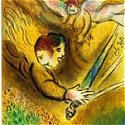
01.17.12 (Tevet 22, 5772) Many people today are concerned about eating "heart friendly" foods, since the strength of the heart is indeed essential for healthy life. It is the heart muscle that pushes life-giving blood throughout the whole body, and as long as the heart is capable of receiving and propelling blood through the arteries, physical life continues. The life is in the blood...
On a spiritual level, the heart functions as the source or "fountain" of life as well. What we feed our inner soul will affect our spiritual well-being and strength. If we consume spiritual junk food, we will become sick and eventually die; if we eat of the Bread of Life, the true sustenance of the Holy Spirit, however, we will be full of life and power (Psalm 37:3).
The Scriptures make it clear that we must "set a watch over our heart." King Solomon's words are from Ruach HaKodesh: "My child, be attentive to my words; incline your ear to my sayings. Let them not escape from your sight; keep them within your heart For they are life to those who find them, and healing to the entire body. Keep your heart with all vigilance, for from it flow the springs of life. Put away from you crooked speech, and put devious talk far from you. Let your eyes look directly forward, and your gaze be straight before you. Make the path of your life level; then all your ways will be sure. Do not swerve to the right or to the left; turn yourself away from evil" (Prov. 4:20-27).
מִכָּל־מִשְׁמָר נְצר לִבֶּךָ
כִּי־מִמֶּנּוּ תּוֹצְאוֹת חַיִּים
mi·kol · mish·mar · ne·tzor · lib·be·kha
ki · mi·me·nu · to·tze·ot · cha·yim

"Guard your heart with all vigilance,
for from it are the sources of life"
(Prov. 4:23)
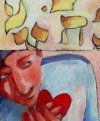
Hebrew Study Card
Notice that the Hebrew word mishmar (מִשְׁמָר) refers to the act of guarding someone closely, just as an officer or warden might keep close watch over a prisoner. The phrase translated "with all vigilance" (mikkol-mishmar) literally means "more than anything that might be guarded," and is used here to intensify the command to guard. The Hebrew text is therefore emphatic: "Above all else, guard your heart..."
We are commanded to carefully guard our heart because from it are totze'ot chaiyim - the "issues" of life. In the Tanakh, the word totze'ot is often used to refer to the borders of territories or the boundaries of a city. This verse is saying that from the heart of a person (lev) a "map" or "chart" to life is drawn. As the heart is either pure or corrupt, so will be the course of one's life. The condition of the heart determines the "contours" of reality.
How you choose to guard your heart from the corruption and hardness of the world will determine the "road" of your life. If you do not take care to keep your heart soft, you will become cynical, weary, and more and more selfish. Your way will be lonely, suspicious, and dangerous. On the other hand, if you carefully keep yourself from the hardness of unbelief, you will experience compassion, encouragement, and the joy of loving others. It is the heart (לֵבָב), or the "inner man," that determines how you will see. In every case the heart is the locus of the will and the affections; it is the fountainhead that supplies all your decisions; it is the practical center of your spiritual life...
The divided heart is sick. A double-minded man is "two-souled" (δίψυχος) and unstable in all its ways (James 1:8). Therefore King David said, "I have set the LORD always before me; because He is at my right hand, I shall not be moved" (Psalm 16:8). David understood the great need for focus, for passion, for surrender: "One thing I ask of the Lord; that is what I will seek" (Psalm 27:4). David understood that walking in the truth required "uniting his heart," or "repairing the breach" within his inner affections so that he could experience reverence and awe before the Divine Presence (Psalm 86:11).
If "purity of heart is to will one thing," then impurity of heart is the result of simultaneously willing two things... It is therefore a state of inner contradiction, of having two separate "minds" or "hearts" holding contrary thoughts or desires.... "How long will you go limping between two different opinions? If the LORD is God, follow him; but if Baal, then follow him" (1 Kings 18:21).
הַעֲבֵר עֵינַי מֵרְאוֹת שָׁוְא בִּדְרָכֶךָ חַיֵּנִי
ha·a·ver ei·nai me·re·ot shav, bid·ra·khe·kha cha·ye·ni

"Turn my eyes from looking at worthless things;
in your ways give me life."
(Psalm 119:37)

Note that the word ha'aver (הַעֲבֵר) is related to the word for Hebrew, ha-ivri (עִבְרִי), implying that a "Hebrew mindset" can help you "cross over" from the realm of vanity to that of reality. When we turn away from worthlessness we will find life and healing in the ways of God.
"The LORD (יהוה) is the God of truth (אֱלהִים אֱמֶת); He is God of Life (אֱלהִים חַיִּים) and the King of eternity (מלֶךְ עוֹלָם)" - Jeremiah 10:10 (John 14:6). May He help each of us to keep close watch over our hearts, letting nothing hurtful enter it that may cause us bitterness and woe... May we all "set a watch over our heart" to walk in the way of true life. Amen.
The Torah of Empathy...

01.17.12 (Tevet 22, 5772) The story of yetziat mitzraim (יְצִיאַת מִצְרַיִם) - the Exodus from Egypt - reveals God's great love and empathy for His people... "God saw the people of Israel, and God knew" (Exod. 2:25). "And the LORD said, "I have surely seen the affliction of my people ... I know their sufferings" (Exod. 3:7). The LORD regarded their affliction when He heard their cry (Psalm 106:44). How much more is God's great love and empathy revealed through the sacrificial life of His Son, Yeshua?
There is an old Chassidic story of two men sitting and enjoying a drink together. One of them then says to the other, "You know, you're my best friend. I really love you, brother!" The other man responds, "Oh yeah? If you really love me, tell me where I hurt..."
The point of this story is that we can't really say we love someone without taking the time to know them -- and that means knowing how they suffer. Most of us are suffering, of course, but are we able to transcend our own pain to genuinely empathize with others? Conversely, how many people do we trust enough to to confide our own pains and heartaches? The Torah of Messiah (תוֹרת המשׁיח) is to bear one another's burdens (τα βαρη, "weights," Gal. 6:2), and that means making ourselves vulnerable -- and making room inside our hearts for the vulnerability of others. James tells us that personal healing comes from "confessing out" (εξομολογεισθε) our sins to one another so that we may be healed (James 5:16). Of course it's humbling to acknowledge our sins, our failures, and our hurts to another, but without an audience for the inner voice of our pain, we suffer all the more...
If someone loves us, they will know "where we hurt"; and if we love them, we will know where they hurt, too. This same principle can also be applied to our relationship to Yeshua... We take comfort that Yeshua sticks closer to us than a brother, interceding on our behalf and "knowing where we hurt." But if we say that we love him, are we are not claiming that we know him and "where he hurts?" Does Yeshua suffer today? The Apostle Paul wrote: "Now I rejoice in my sufferings for your sake, and in my flesh I am filling up what is lacking in Christ's afflictions for the sake of his body, that is, the church" (Col. 1:24). What is "lacking in Christ's afflictions" is our present sacrifice for the sake of others... Yeshua hungers with those who are hungry, thirsts with those who are thirsty, feels loneliness with those who are abandoned, shivers with those who are cold, weeps with those who are forlorn, is imprisoned with those who are incarcerated, is sick with those who are ill, and so on (Matt. 25:31-ff). Yeshua feels the pain of even the "least of these my brothers." This is where he hurts, chaverim...
The essential difference between the righteous and the unrighteous is revealed in their response shown to those in need. After all, on the Day of Judgment, both the righteous and the unrighteous will account for their choices in light of the selfsame needy and pain-riddled world. The destiny of each person will be determined by whether he or she took the time to genuinely engage the suffering of others: "Lord, when did we see you hungry and feed you, or thirsty and give you drink?" (Matt. 25:32-46). May the LORD help us to share His heart and passion for a lost and hurting world.
זאת הִיא מִצְוָתִי
אֶהֱבוּ זֶה אֶת זֶה כְּמוֹ שֶׁאֲהַבְתִּי אֶתְכֶם
אֵין אַהֲבָה גְּדוֹלָה מֵאַהֲבָתוֹ
שֶׁל הַנּוֹתֵן אֶת נַפְשׁוֹ בְּעַד יְדִידָיו
יְדִידַי אַתֶּם אִם תַּעֲשׂוֹ אֶת
אַשֶׁר אֲנִי מְצַוֶּה אֶתְכֶם
zot · hi · mitz·va·ti --
e·ha·vu · zeh · et · zeh · ke·mo · she·a·hav·ti · et·khem
ein · a·ha·vah · ge·do·lah · me·a·ha·va·to
shel · ha·no·ten · et · naf·sho · be·ad · ye·di·dav
ye·di·dai · at·tem · im · ta·a·su · et
a·sher · a·ni · me·tza·veh · et·khem

"This is my commandment,
that you love one another as I have loved you.
Greater love has no one than this,
that someone lay down his life for his friends.
You are my friends if you do what I command you."
(John 15:12-14)
Αὕτη ἐστὶν ἡ ἐντολὴ ἡ ἐμή,
ἵνα ἀγαπᾶτε ἀλλήλους, καθὼς ἠγάπησα ὑμᾶς.
Μείζονα ταύτης ἀγάπην οὐδεὶς ἔχει,
ἵνα τις τὴν ψυχὴν αὐτοῦ θῇ ὑπὲρ τῶν φίλων αὐτοῦ.
῾Υμεῖς φίλοι μου ἐστέ, ἐὰν ποιῆτε ὅσα ἐγὼ ἐντέλλομαι ὑμῖν.
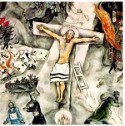
The "Torah of Messiah" (תוֹרת המשׁיח) is the practice of sacrificial love that willingly bears the weight of sin for our redemption, healing and life... The Torah of Yeshua is both entirely rooted in the revelation of the Torah of Moses and is its consummate expression.
Finding Inner Strength
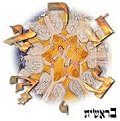
01.16.12 (Tevet 21, 5772) The Hebrew word for "world" or "age" is olam (עוֹלָם), which is derived from a root verb (עָלַם) that means "to conceal" or "to hide." God "hides" His face from us so that we will seek Him, and that means pressing through ambiguity to earnestly take hold of the truth. Therefore King David said, בַּקְּשׁוּ פָנָיו תָּמִיד/ bakeshu fanav tamid: "Seek His face continually" (Psalm 105:4). Note that the gematria (numerical value) for the word "fanav" (i.e., "His face") is the same as that for the word "olam." When we truly seek God's face (i.e., His Presence) we are able to discern the underlying purpose for our lives.
דִּרְשׁוּ יְהוָה וְעֻזּוֹ
בַּקְּשׁוּ פָנָיו תָּמִיד
dir·shu · Adonai · ve·u·zo
ba·ke·shu · fa·nav · ta·mid

"Seek the LORD and his strength;
seek his presence continually."
(Psalm 105:4)
ζητήσατε τὸν κύριον καὶ κραταιώθητε
ζητήσατε τὸ πρόσωπον αὐτοῦ διὰ παντός
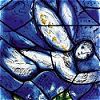
The ancient Greek version of the Torah (i.e., the Septuagint) translates this verse, "Seek the LORD and be strengthened; seek His face through everything (διὰ παντός)." The LORD God gives us "inner strength" (i.e., ἐγκράτεια, from εν-, "in" + κράτος, "strength" or "power") when we yield to "the power of His might" (ἐν τῷ κράτει τῆς ἰσχύος αὐτοῦ) (Gal. 5:22-23; Eph. 6:10). Therefore we must remember God's power and glory, for "He is the LORD our God (הוּא יְהוָה אֱלהֵינוּ); His judgments are in all the earth" (Psalm 105:7).
כּה־אָמַר יְהוָה לָכֶם
אַתֶּם אַל־תִּירְאוּ וְאַל־תֵּחַתּוּ מִפְּנֵי הֶהָמוֹן הָרָב הַזֶּה
כִּי לא לָכֶם הַמִּלְחָמָה כִּי לֵאלהִים
ko · a·mar · Adonai · la·khem
at·tem · al · tir·u · ve·al · te·cha·tu · mi·pe·nei · he·ha·mon · ha·rav · haz·zeh
ki · lo · la·khem · ha·mil·cha·mah · ki · lei·lo·him

"Thus says the LORD to you,
'Do not be afraid and do not be dismayed because of this great multitude,
for the battle is not yours but God's."
(2 Chron. 20:15)

In the face of seemingly certain defeat at the hands of their enemies, King Jehoshaphat and the people of Judah found themselves swallowed up with fear. The king, however, "set his face to seek the LORD" and called for a national fast. Indeed, all the people of Judah assembled together to seek the LORD at Jerusalem. The king then prayed for deliverance (2 Chron. 20:6-12), saying (among other things), "O LORD, God of our fathers, are you not God in heaven? You rule over all the kingdoms of the nations. In your hand are power and might, so that none is able to withstand you.... For we are powerless against this great horde that is coming against us. We do not know what to do, but our eyes are on you." Then the Spirit of the LORD (רוּחַ יְהוָה) spoke through one of the Levites saying, ".. do not be afraid.. for the battle is not yours ("for you"), but is "for God."
The battle and indeed the war belongs to Adonai Tzeva'ot (יְהוָה צְבָאוֹת), the LORD of the armies of heaven. "The LORD your God who goes before you will himself fight for you, just as he did for you in Egypt before your eyes" (Deut. 1:30). May you look to Him for your victory this very hour, chaverim...
 |
Parashat Va'era - וארא

01.16.12 (Tevet 21, 5772) The Torah reading for this week is parashat Va'era, the second portion of the Book of Exodus. In a Sefer Torah (Torah scroll), this portion contains exactly 121 verses (pesukim), 1748 words, and 6,701 letters.
The reading begins:
God (אֱלהִים) spoke to Moses and said to him, "I am the LORD (יהוה). I appeared to Abraham, to Isaac, and to Jacob as El Shaddai (אל שׁדּי), but by My Name the LORD (יהוה) I did not make myself known to them" (Exod. 6:2-3).
This is a puzzling verse, especially since it is apparent that each of the avot (i.e., the patriarchs Abraham, Isaac, and Jacob) called upon the Name of the LORD (see Gen. 12:7-8, 26:25; 28:16, 32:9, 49:18, etc.). Traditionally understood, the Name (YHVH) reveals God's attributes of compassion and immanence, whereas the Name Elohim reveals God's attributes of justice and transcendence. According to many of the sages, the Name YHVH is directly revealed in God's compassionate redemptive activity, especially as it relates to the creation and redemption of mankind (for more on this, see "The Revelation of the Name YHVH"). God therefore instructed Moses to go and say to the people, "I am the LORD and I will bring you out from under the burdens of the Egyptians, and I will deliver you from their bondage, and I will redeem you with an outstretched arm and with great judgment; and I will take you to me for a people and I will be to you a God" (these four statements are sometimes called the "four expressions of redemption" which are associated with the "four cups" of the traditional Passover seder). The people would see the compassion and love of God in a way the patriarchs never did, since the LORD would directly intervene to rescue His people from their oppression and suffering in Egypt...
Note that the gematria of the verse, "God (אֱלהִים) spoke to Moses and said to him, "I am the LORD (יהוה)" is 1075. Another verse with the same numeric equivalence is Psalm 130:4, which reads, "For with You there is forgiveness (הַסְּלִיחָה), that You may be feared." The revelation of the Name of the LORD centers on forgiveness and awe...

Note further that word Va'era (וארא) means "I appeared" and has a numerical value of 208 -- the same value as the name Yitzchak (יצחק). This suggests a connection between the Akedah (the merit of Isaac who willingly offered up his life upon the altar) and the redemption (גְּאֻלָּה) of the LORD (יהוה) that was effected by the blood of the Passover lamb during the Exodus... Since Isaac (who foreshadowed Yeshua) was willing to sacrifice his life to the LORD, so the LORD returned his utmost loyalty by rescuing his children from the "iron furnace of Egypt." The ultimate Passover sacrifice given through Yeshua, the "Lamb of God" finally and forever reconciled the attributes of God as Elohim (justice, holiness, transcendence) and God as YHVH (mercy, love, compassion). Only at the Cross of Yeshua may it be said: חֶסֶד־וֶאֱמֶת נִפְגָּשׁוּ צֶדֶק וְשָׁלוֹם נָשָׁקוּ - "mercy and truth have met, justice and peace have kissed" (Psalm 85:10).
Note: I hope to add some additional commentary regarding this portion later this week, chaverim. Thank you so much for praying for this ministry... Shalom for now.
 |
Shabbat Table Talk for Shemot

[ The following entry is related to this week's Torah reading (Shemot). Please read the Torah portion to "find your place" here. ]
01.13.12 (Tevet 18, 5772) The Torah reading for this week is the very first of the Book of Exodus, called parashat Shemot (שְׁמוֹת). Some of the greatest narratives of all the Scriptures are found in this book, including the Israelites' enslavement and subsequent deliverance with the ten plagues by the hand of the LORD. After the very first Passover, Moses led the people out of the land Egypt, crossing the Sea of Reeds, and arriving at Sinai to receive the Torah exactly 49 day later.... While Moses was on the mountain, however, the people worshipped a Golden Calf, and a long period of repentance occurred until the covenant was reestablished. The remainder of the book describes the details and construction of the Mishkan (Tabernacle).
Assuredly the great Exodus from Egypt is one of the most fundamental and defining events of the Jewish people. In addition to being commemorated every year during Passover (Exod. 12:24-27; Num. 9:2-3; Deut. 16:1), it is explicitly mentioned in the first of the Ten Commandments (Exod. 20:2), and it is recalled every Sabbath (Deut. 5:12-15). The festivals of Shavuot and Sukkot likewise derive from it, the former recalling the giving of the Torah at Sinai and the latter recalling God's care as the Exodus generation journeyed from Egypt to the Promised Land... Indeed, nearly every commandment of the Torah - culminating in the revelation of the Tabernacle and the sacrificial system - may be traced back to the story of the Exodus. For the follower of Yeshua, the Exodus prefigures and exemplifies the work of redemption given through the Messiah as the Lamb of God.
As mentioned above, the Exodus from Egypt led directly to the revelation of the Torah at Mount Sinai (49 days later), which itself centered on the revelation of the altar (i.e., the Tabernacle). The Israelites were redeemed by the blood of the lamb (a sacrifice that preceded the giving of the law) and were then led to confront the meaning of the sacrifice by means of the altar at the Sanctuary. God first saved the people and then revealed His holy standards; the culmination of His Torah (i.e., will) was the revelation of the Tabernacle, which expressed the pattern of His love delivered to us through blood atonement.
Ultimately, then, the Exodus from Egypt is a grand "parable" about Yeshua, and indeed the Torah of Moses really makes no sense apart from Him... Only those who love Yeshua can be Torah-true; just as only followers of Yeshua can be genuine philosophers (i.e., lovers of wisdom, which is another name for Yeshua, who is the Wisdom of God).
To help you discuss the very first Torah portion of the Book of Exodus, I wrote a new Shabbat "Table Talk" for Parashat Shemot. Like others you can find on this site, first I include a brief summary of the reading followed by a set of questions and answers. Hopefully this material will prompt some interesting discussion for your Sabbath. You can download the PDF file from the linked page (above) or by directly clicking here:
We wish you a very peaceful and healing Shabbat, chaverim... Our LORD has said, "My grace is sufficient for you (חַסְדִּי רַב־לְךָ), for my power is made perfect in weakness" (2 Cor. 12:9). Therefore by the grace of God "I am what I am" (1 Cor. 15:10), and I gladly live in daily dependence of the miraculous power of God to see me through the day. May the power of God rest upon you, chaverim!
זִרְעוּ לָכֶם לִצְדָקָה קִצְרוּ לְפִי־חֶסֶד
נִירוּ לָכֶם נִיר וְעֵת לִדְרוֹשׁ אֶת־יְהוָה
עַד־יָבוֹא וְירֶה צֶדֶק לָכֶם
zir·u · la·khem · litz·da·kah · ki·tze·zru · le·fi · che·sed
ni·ru · la·khem · nir · ve·et · lid·rosh · et · Adonai
ad · ya·vo · ve·yo·reh · tze·dek · la·khem

"Sow righteousness for yourselves; reap according to lovingkindness;
break up your fallow ground, for it is the time to seek the LORD,
so that He may come and rain righteousness upon you.
(Hosea 10:12)

Seeking what is Above...

01.12.12 (Tevet 17, 5772) "If then you have been raised with Messiah, seek the things that are above (τὰ ἄνω ζητεῖτε), where the Messiah is seated at the right hand of God (לִימִין אֱלהִים). Focus your thoughts on the things above, not on things here on earth. For you have died, and your life has been hidden with Messiah in God. Then when the Messiah, who is your life, appears, you too will appear with him in glory" (Col. 3:1-4).
All of this turns on our faith... If we are spiritually identified with Yeshua, we are "dead" to this age (olam hazeh), and therefore we are awakened to a realm that transcends the appeals of carnal flesh (olam habah). We no longer live chayei sha'ah (חַיֵּי שָׁעָה, "fleeting life") but chayei olam (חַיֵּי עוֹלָם, "eternal life"). The arorist verb "you have died" indicates "you have died once for all," that is, this is a condition granted by the power and agency of God on your behalf. You don't "try to die" to the flesh; you accept what God has done by killing its power over you through Yeshua... You are dead to this world; you are dead to sin's power; you are no longer enslaved to the deception of the worldly matrix, etc. Now you are made alive to an entirely greater and more powerful order and dimension of reality, namely, the spiritual reality that is not disclosed to the vanity of this age. Therefore we are to consciously focus our thoughts (φρονέω) on the hidden reality of God rather than on the temporal world that is passing away: "For we are looking not to the things that are seen but to the things that are unseen. For the things that are seen are transient (i.e., "just for a season," καιρός), but the things that are unseen are eternal" (2 Cor. 4:18).
We share the visibility of the Messiah in this age... Since He is presently hidden from view, "the world knoweth us not, because it knew him not" (1 John 3:1); on the other hand, when He is revealed from heaven, so we will appear with him in glory... Therefore "being dead" is an inversely reciprocal relationship: being dead to this world is to be alive in the other world, and vice-versa.... We have "hidden life" in the Messiah, as it is written: "your life has been hidden (i.e., κρύπτω, "concealed," "disguised") with the Messiah in God." By faith you are made dead to one order of reality so that you would be made alive to another order of reality, to the reality of God that transcends the shadows and decay of this world. Your life has been hidden - like a "hidden treasure" - with the Messiah, who holds its store for you and will reveal its glory in the coming age. Because Yeshua knows you by name, calls you to follow Him, and is your Sin-Bearer, Priest, Advocate, and Savior before the throne of God, your life is indeed "hidden with Him," and you are made secure through His all-powerful providential care... Praise His Name forever.
"I shall never forget one summer afternoon, when I was preaching in a village chapel about the joys of heaven, that an elderly lady sitting on my right kept looking to me with intense delight. Some people's eyes greatly help the preacher. A telegraph goes on between us. She seemed to say, "Bless God for that!" "How I am enjoying it!" She kept drinking in the truth, and I poured out more and more precious things about the eternal kingdom and the sight of the Well-Beloved, till I saw what I thought was strange light pass over her face. I went on, and those eyes were still fixed on me. She sat still as a marble figure, and I stopped and said, "Friends, I think that yon sister over there is dead." They said that it was even so, and they bore her away. She had gone. While I was telling of heaven, she had gone there; and I remember saying that I wished that it had been my case as well as hers... I look forward to the day when I shall see her again. I shall know those eyes, I am sure I shall." - Charles Spurgeon
Following Yeshua is not a matter of intellectual curiosity, much less should it produce "theological obesity" in our lives... No, salvation is a matter of life and death. We esteem earthly doctors because they are healers of the body, but how much more do people need true healers of the soul? "Be not deceived" about your own hope for eternity; "God is not mocked" (μυκτηρίζω). He knows your inner motivations with perfect clarity. To "serve" God in the truth means being willing to face ongoing self-examination, to own up to the truth about yourself, to be real, to be honest. We are here to share the message of God's love and to help bring others to eternal life. Yeshua's fiercest words of condemnation were reserved for those who played games with "religion" - for those who forgot that people were literally dying without God's love... May God help us remember what is closest to His heart, chaverim...
Overcoming Anger...

01.12.12 (Tevet 17, 5772) The sages say that anger is a kind of idolatry, since it is often rooted in a selfish demand that things must happen according to our will. When we feel like we are losing control, we are liable to lash out like a "little Pharaoh" demanding to be seen, heard, and obeyed... Such anger denies that the LORD is fully in control and therefore incites the soul to seize control for itself, and in that regard, is linked to fear. However, the autonomous "vaunting of the will" is really a form of madness, since "we have met the enemy, and it is us." Indeed, it is often easier to blame and fight an outside enemy than to honestly contend with the one within... Who is a truly strong man? One who is able to patiently restrain his emotions and who refuses to be overmastered by his lusts: "Better is the one who is slow to anger than the mighty warrior, and the one who rules his spirit is stronger than one who takes a city."
טוֹב אֶרֶךְ אַפַּיִם מִגִּבּוֹר
וּמשֵׁל בְּרוּחוֹ מִלּכֵד עִיר
tov · e·rekh · a·pa·yim · mi·gib·bor
u·mo·shel · be·ru·cho · mi·lo·khed · ir

"Better is the one who is slow to anger than the mighty warrior,
and the one who rules his spirit is stronger than one who takes a city."
(Prov. 16:32)

We are commanded to "put away" bitterness, resentment, wrath, anger, malice, and so on (Eph. 4:31; Col. 3:8), but how are we to find the strength to do that? We can find the strength only by understanding the power of our life "in" Yeshua the Messiah. In other words, overcoming anger ultimately is a matter of faith... Self-control or "inner strength" (i.e., ἐγκράτεια, from εν-, "in" + κράτος, "strength" or "power") is listed as one of the nine "fruits of the Holy Spirit" listed in Gal. 5:22-23. God has promised to give us power (δύναμις) to carry out His will: "Finally my brothers, be strong in the LORD and in the power of His might" (ἐν τῷ κράτει τῆς ἰσχύος αὐτοῦ) (Eph. 6:10). Note, however, that that the phrase "power of His might" uses the same word (κράτος) to describe the fruit of the Spirit within us... In other words, it is the strength of Yeshua living within our hearts that enables us to live free from the passions of the lower nature... Yeshua (alone) sets us free from the "law of sin and death," that is, the perpetual cycle of pride and shame that comes from trying to justify our existence in this world...
It is written, "A person shows intelligence through forebearance; it is glory (lit. "tiferet," beauty) to overlook an offense" (Prov. 19:11). Using the good eye of faith (ayin tovah) can reveal truth about a circumstance that may well be hidden. When we are patient and slow to anger, we carry a forgiving and humble attitude toward life. Practicing patience and kindness helps us to "walk in the Name of the LORD" (Micah 4:5), the One who is "merciful and gracious, slow to anger and abounding in love and truth" (Exod. 34:6). It is for the glory and beauty and honor of his Name that the LORD "defers his anger" and "refrains from" cutting off those that offend him (Isaiah 48:9). Therefore as we walk in love, we can disarm hostility in others by choosing to regard them in the best possible light...
May it please HaShem our LORD to strengthen our faith and to help each of us express the inherent grace and power of the Holy Spirit within us... Amen.
 |
Refuse to be Vexed...
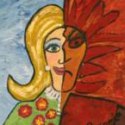
01.12.12 (Tevet 17, 5772) It's really easy to become downcast and angry about this evil world, chaverim, especially whenever we read the so-called "news" of the day... The wicked seem to go through this life with impunity, enjoying power and prosperity, while the righteous regularly suffer anxiety, distress, and heartache. The Scriptures, however, have a word for us that we would do well to heed:
הֶרֶף מֵאַף וַעֲזב חֵמָה
אַל־תִּתְחַר אַךְ־לְהָרֵעַ
כִּי־מְרֵעִים יִכָּרֵתוּן
וְקוֵי יְהוָה הֵמָּה יִירְשׁוּ־אָרֶץ
che·ref · me·af · va·a·zov · che·mah
al · tit·char · akh · le·ha·re·a;
ki · me·re·im · yik·ka·re·tun
ve·ko·vei · Adonai · he·mah · yir·shu · a·retz

"Refrain from anger, and forsake rage!
Refuse to be vexed -- it tends only to more evil.
For the evildoers shall be cut off,
but those who hope for the LORD shall inherit the land."
(Psalm 37:8-9)
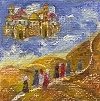
Note that the word cheref (הֶרֶף) comes from a verb (רָפָה) that means "to slacken," "to let go," "to drop," "to forget." The word for rage (חֵמָה), on the other hand, implies an inward burning or agitation that may lead to violence (the very opposite of "letting go" or forgiving). The fate of the evildoer is karet (כָּרַת) judgment (being "cut off" by untimely death), but the person who waits/hopes (קָוָה) in the LORD will inherit (יָרַשׁ) the land...
The wicked are given temporary prosperity and triumph in olam hazeh (this age), but ultimately they will give a complete accounting of their lives before the LORD God Almighty. Meanwhile we must always walk in righteousness - regardless of what others may do - and we must be careful not allow the conduct or status of others incite us to anger, envy, discontent, criticism, the use of disparaging words, etc. We must always look to our own character and conduct first (Matt. 7:3) and forsake the desire always to be "right" or to find offence at others.
May we consciously entrust our lives to the care of our LORD who sees and knows all, and bears everything for us.... And may it please the LORD God to help us rest satisfied with the knowledge that He will indeed make all things work for good to us -- including His hidden decrees of providence that allow the wicked to have power for a short season during this age. Since we know that the "wrath of man never works the righteousness of God" (James 1:20), may God help us to forever "refused to be vexed." Amen.
 |
Ehyeh Asher Ehyeh...

[ The following entry is related to this week's Torah reading (Shemot). Please read the Torah portion to "find your place" here. ]
01.12.12 (Tevet 17, 5772) In this week's Torah portion (Shemot) the LORD describes His Name as "I AM WHO I AM" (i.e., ehyeh asher ehyeh: אֶהְיֶה אֲשֶׁר אֶהְיֶה). God then went on to further denote the meaning of His Name through a series of relationships: "Say this to the people of Israel, 'The LORD (יהוה), [namely] the God of your fathers, [namely] the God of Abraham (אֱלהֵי אַבְרָהָם), [namely] the God of Isaac (אֱלהֵי יִצְחָק), and [namely] the God of Jacob (אֱלהֵי יַעֲקב), has sent me to you.' This is my Name forever (זֶה־שְּׁמִי לְעלָם), and thus I am to be remembered throughout all generations" (Exod. 3:14-15):
וַיּאמֶר אֱלהִים אֶל־משֶׁה אֶהְיֶה אֲשֶׁר אֶהְיֶה
וַיּאמֶר כּה תאמַר לִבְנֵי יִשְׂרָאֵל
אֶהְיֶה שְׁלָחַנִי אֲלֵיכֶם׃
וַיּאמֶר עוֹד אֱלהִים אֶל־משֶׁה
כּה־תאמַר אֶל־בְּנֵי יִשְׂרָאֵל
יְהוָה אֱלהֵי אֲבתֵיכֶם אֱלהֵי אַבְרָהָם
אֱלהֵי יִצְחָק וֵאלהֵי יַעֲקב שְׁלָחַנִי אֲלֵיכֶם
זֶה־שְּׁמִי לְעלָם וְזֶה זִכְרִי לְדר דּר
va·yo·mer · E·lo·him · el · Mo·she · eh·yeh · a·sher · eh·yeh
va·yo·mer · koh · to·mar · liv·nei · Yis·ra·el
eh·yeh · she·la·cha·ni · a·le·khem
va·yo·mer · od · E·lo·him · el · Mo·she
ko · to·mar · el · be·nei · Yis·ra·el
Adonai · E·lo·hei · a·vo·te·khem · E·lo·hei · Av·ra·ham
E·lo·hei · Yitz·chak · ve·lo·hei · Ya·a·kov · she·la·cha·ni · a·le·khem
zeh · she·mi · le·o·lam · ve·zeh · zikh·ri · le·dor · dor

"God said to Moses, "I AM WHO I AM."
And he said, "Say this to the sons of Israel,
'I AM has sent me to you.'"
God also said to Moses,
"Say this to the sons of Israel,
'The LORD, the God of your fathers, the God of Abraham,
the God of Isaac, and the God of Jacob, has sent me to you.'
This is my name forever, and thus I am to be remembered throughout all generations."
(Exod. 3:14-15)

The phrase ehyeh asher ehyeh (rendered as "I AM THAT I AM" in English) derives from the Qal imperfect first person form of the verb hayah (הָיָה), "I will be," and therefore indicates a connection between the Name YHVH (יהוה) and being itself. YHVH is the Source of all being and has being inherent in Himself (i.e., He is necessary Being), and everything else - from the most gigantic of cosmic objects to the structure of cellular DNA - contingently derives its existence and being from Him. The name YHVH also bespeaks the utter transcendence of God. In Himself, God is beyond all "predications" or attributes of language: He is the Source and Foundation of all possibility of utterance and thus is beyond all definite descriptions.
In light of this, it is not without some justification that Jewish theology tends to regard God as Ein Sof (אֵין סוֹף), the "Infinite One," and considers the hundreds of other names and titles of God to be anthropomorphic descriptions of how He reveals Himself to human beings. This furthermore explains why some of the Jewish sages have said that the Name of God may be uttered by reciting all 304,805 letters of the Torah in a series. That is, string together all 304,805 letters of the Torah - from the first letter of Bereshit (Bet) through the last letter of Devarim (Lamed) - and "read" this as a single "word." There you have it! (Of course, we should also add the letters for the Prophets (Neviim) and the Writings (Ketuvim) to the Torah's 304,805 letters, not to mention the 138,020 words of the Greek New Testament to form the 3,000,000+ letter name of God!)
The Name of God is meant to induce humility within our hearts... It is "hameforash," the unutterable Name, because the LORD is wonderful and far beyond what language can possibly describe... As the revelation given to Moses shows, however, the LORD (יהוה) calls Himself "the God of Israel" to link His faithful love with His Salvation. Later this Name is revealed as Yeshua (Jesus), which is indeed the Name of the Savior of the world....
I bring all this up because some "Messianic" ministries advocate a "special name" for God other than (or over and above) the name of Yeshua (יֵשׁוּעַ). One way to test the spirits on this question is to determine if the ministry plainly confesses (and celebrates!) that Yeshua is indeed the LORD God Almighty, the "Name above all Names" (Phil. 2:9-11) -- or whether they waffle on this issue by focusing instead on the name YHVH... Do they spend an exorbitant amount of time and energy on the phonetics of the name of God, offering permutations or linguistic variations while overlooking the fact that the Name refers to Something beyond the merely linguistic? Do they disdain the name Jesus or ridicule Christians who use the name "Christ," regarding them as "pagan" or "Gentile"? Are they part of the "Sacred Name" movement (i.e., cult)? Do they attempt to impress you with the secret meaning of Hebrew words and spurious intellectualism? Do they suggest that Christian theology is inherently suspect and should not be trusted? Do they mock the idea of the Trinity as incoherent or perhaps even unscriptural? Test the spirits. Ask yourself if they are missing the point of God's revelation by taking the Name of the LORD in vain.
 |
Salvation by Faith in God's Grace...

[ The following entry is related to this week's Torah reading (Shemot). Please read the Torah portion to "find your place" here. ]
01.11.12 (Tevet 16, 5772) Faith is the essence of all true Torah from heaven, since apart from it no one can possibly draw near to God... Indeed the very purpose of creation is to receive the love of the Creator, and consequently whoever disregards or suppresses this truth necessarily fails to apprehend the essential reason for his or her existence. The meaning or message of reality itself is revealed in God's love (1 John 4:8).
Since love for God must be tested to ensure its integrity, it is noteworthy that Jacob (and his sons) explicitly followed God's guidance before immigrating to Egypt, which subsequently led to their oppression by the "new king" of Egypt (see Gen. 46:1-7). Despite the betrayal often afforded by mere appearances, howver, consider how great is the merit of faith, since Israel was redeemed from Egypt only as a reward for trusting in promise of their deliverance, as it is written, "and the people believed" (וַיַּאֲמֵן הָעָם) ... and bowed their heads and worshiped" (Exod. 4:31). Salvation has always been based on faith in God's love and grace...
Like the precious promises of a bridegroom to his beloved, the words of Torah are to be kept in the "midst of the heart" where they serve as a source of life (Prov. 4:21-22). Therefore the prophet later sees the land besieged by foreigners and yet signs the deed to redeem the land in the days ahead. Though Jeremiah was to be evicted from the land and subjugated by the Babylonians, he never lost faith in God's promise...
The Talmud (Makkot 23b-24a) says, "Moses gave Israel 613 commandments, David reduced them to eleven (Psalm 15), Isaiah to six (Isaiah 33:15-16), Micah to three (Micah 6:8), Isaiah reduced them again to two (Isaiah 56:1); but it was Habakkuk who gave the one essential commandment: v'tzaddik be'emunato yich'yeh (וְצַדִּיק בֶּאֱמוּנָתוֹ יִחְיֶה), literally, "the righteous one, by his trust, shall find life" (Hab. 2:4).
הִנֵּה עֻפְּלָה לא־יָשְׁרָה נַפְשׁוֹ בּוֹ
וְצַדִּיק בֶּאֱמוּנָתוֹ יִחְיֶה
hin·nei u·pe·lah lo ya·she·rah naf·sho bo
ve·tzad·dik be·e·mu·na·to yich·yeh

"Behold, his soul is puffed up; it is not upright within him,
but the righteous shall find life by means of his trust."
(Hab. 2:4)

Hebrew Study Card
In the New Testament, the apostle Paul likewise distilled the various commandments of the Torah to this primordial principle that the righteous one shall live by his trust (see Rom. 1:17, Gal. 3:11, and Heb. 10:38). Spiritual life is the blessing of faith, since apart from faith we are spiritually dead and "powerless (ἀδύνατος) to please God" (Heb. 11:6). As King David said, "The LORD is near to all who call upon Him - to all who call upon Him in the truth" (Psalm 145:18). God is near to the honest soul who confesses the truth about his need, just as God distances himself from the proud and puffed up soul.... This is the "like-for-like" nature of faith: "according to your faith let it be it done for you" (Matt. 9:29). This works the other way around, too. Genuine faith implies "walking in God's ways" (Deut. 28:9). Just as God is the Merciful One, so you practice mercy; just as He is the Gracious One, so you perform acts of grace; just as God is the Holy One, so should you be holy, and so on. We must be "wholehearted" before the LORD (Deut. 18:13; Matt. 5:48) - that is, the inner life must be in agreement with outer life, free of hypocrisy or dissimulation. As the prophet Jeremiah attested: "The LORD (יהוה) is the God of truth (אֱלהִים אֱמֶת); He is God of Life (אֱלהִים חַיִּים) and the King of eternity (מלֶךְ עוֹלָם)" - Jer. 10:10 , cp. John 14:6). Therefore we are called to trust in the LORD and "feed upon" His faithfulness:
בְּטַח בַּיהוָה וַעֲשֵׂה־טוֹב
שְׁכָן־אֶרֶץ וּרְעֵה אֱמוּנָה
be·tach · badonai · va·a·seh · tov
she·khon · e·retz · u·re·eh · e·mu·nah

"Trust in the LORD, and do good;
dwell in the land and feed on faithfulness"
(Psalm 37:3)
Consider again that Israel was redeemed from Egypt only as a reward for trusting in promise of their deliverance, as it is written, "and the people believed" (וַיַּאֲמֵן הָעָם) ... and bowed their heads and worshiped" (Exod. 4:31). In the future, too, Israel will be redeemed as a reward of their faith, since it is written of Israel: "Open the gates, that the righteous nation that keeps faith may enter in" (Isa. 26:2).
The Christian faith can never be separated from theological Zionism, since impugning God's faithfulness and truth to Israel is to impugn His faithfulness and truth to the church... No, God has a sure plan for Israel that will never, ever fail. Speaking of the End of Days, the prophet declares, "Israel has been saved by the LORD with an everlasting salvation; you shall not be put to shame nor disgraced forever in all the ages to come" (Isa. 45:17).
יִשְׂרָאֵל נוֹשַׁע בַּיהוָה תְּשׁוּעַת עוֹלָמִים
לא־תֵבשׁוּ וְלא־תִכָּלְמוּ עַד־עוֹלְמֵי עַד
yis·ra·el · no·sha · badonai · te·shu·at · o·la·mim
lo · te·vo·shu · ve·lo · tik·ka·le·mu · ad · ol·mei · ad

"Israel has been saved by the LORD with an everlasting salvation;
you shall not be put to shame nor disgraced forever in all the ages to come."
(Isa. 45:17)
The message of God's redemption of Israel was prophetic of His salvation for the entire world... As I have said repeatedly before, what you believe about Israel and the Jewish people will affect all other areas your Christian theology.
The New Pharaoh's Dream...

[ The following entry is related to this week's Torah reading (Shemot). Please read the Torah portion to "find your place" here. ]
01.10.12 (Tevet 15, 5772) According to midrash, the new king (מֶלֶךְ־חָדָשׁ) "who did not know Joseph" (Exod. 1:8) had a disturbing prophetic dream like his predecessor. He saw himself sitting on his throne in all his regal glory. As he lifted his eyes, however, an old man appeared holding a balance in his hand. The old man placed all the nobles and governors of Egypt on one side of the balance, and on the other side, he placed one small lamb. To Pharaoh's great astonishment, however, the lamb outweighed all the leaders of Egypt...
When the king asked his advisors to interpret the dream, they told him that it foretold of a coming king who would destroy the land, kill the Egyptians, and set the Israelites free. The royal astrologers agreed with the advisors and told the king that the stars indicated that such a redeemer would indeed come, but it was unclear if he would be an Egyptian or an Israelite (recall that Moses was both - an Israelite raised as an Egyptian). For this reason the king decreed the death of all the newborn sons of Egypt – whether Israelite or Egyptian. When the king further asked the astrologers how this redeemer could be stopped, they said he would die by water (recall Moses' sin of the water from the rock), so the Pharaoh decreed that all the newborns should be killed by being thrown into the Nile river....
Of course the rest of the Book of Exodus is essentially God's interpretation of the new Pharaoh's dream, as the great events of the Exodus would reveal. The LORD God of Israel forewarned this king that Egypt would come into judgment by the Lamb of God... Indeed, the only way to escape this judgment and the wrath of God was by being covered by the sacrificial blood of the lamb... The Lamb of God is central to Israel's deliverance and becomes the focal point of the revelation of the sanctuary later given at Sinai....
Consider how great is the merit of faith, however, since Israel was redeemed from Egypt solely as a reward for trusting in promise of their deliverance, as it is written, "and the people believed" (וַיַּאֲמֵן הָעָם) ... and bowed their heads and worshipped" (Exod. 4:31). Recall that the blood of the korban Pesach - the Passover lamb - was to be smeared on the two sides and top of the doorway, resembling the shape of the letter Chet (ח). This letter, signifying the number 8, is connected with the word חי (chai), short for chayim (life). The blood of the lamb (דַּם הַשֶּׂה) not only saves from the judgment of death, but it also is the means of imparting divine life and power...

Just as the Jewish people were saved by trusting in the efficacy of the blood of the lamb during the LORD's Passover in Egypt, so we are saved by trusting in Yeshua as the sacrificial Lamb of God (שֵׂה הָאֱלהִים) who causes God's judgment to "pass over" us (John 1:29). Yeshua is the source of our forgiveness and power with God...
Note: The Book of Exodus begins with these words, v'eleh shemot b'nei yisrael ha'ba'im mitzraimah (וְאֵלֶּה שְׁמוֹת בְּנֵי יִשְׂרָאֵל הַבָּאִים מִצְרָיְמָה), which is usually translated as "these are the names of the sons of Israel who came to Egypt..." (Exod. 1:1). The literal translation, however, is "these are the names of the sons of Israel who are coming to Egypt..." The opening words of the book, then, indicate the timelessness of the story of the exodus and the need for all people to find deliverance in Yeshua, the true Lamb of God.
עֵינֵי יְהוָה אֶל־צַדִּיקִים
וְאָזְנָיו אֶל־שַׁוְעָתָם
ei·nei · Adonai · el · tzad·di·kim
ve·oz·nav · el · shav·a·tam

"The eyes of the LORD are toward the righteous
and his ears toward their cry"
(Psalm 34:15)
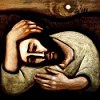
The LORD hears "the cry" – shavah (שַׁוְעָה) – of the righteous. Shavah is used to describe the cry of anguish, the cry of the oppressed, the cry of those who are approaching a breaking point. We read in this week's Torah portion: "The Israelites cried out (וַיִּזְעָקוּ) and their cry (שַׁוְעָתָם, i.e., their "shavah") came up to God" (Exod. 2:23). And such is the way of all genuine deliverance, is it not? We have to be brought to the "breaking point" before we will cry out to the LORD for deliverance with all our hearts...
God knows your name...
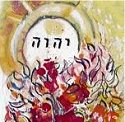
[ The following entry is related to this week's Torah reading (Shemot). Please read the Torah portion to "find your place" here. ]
01.09.12 (Tevet 14, 5772) The Book of Exodus begins, ve'eleh shemot (וְאֵלֶּה שְׁמוֹת), "and these are the names" (of the sons of Israel). God calls each person by name to make the journey... Indeed, God calls each star by its own name (Gen. 22:17, Psalm 147:4) and yet He also knows each lily of the field and sparrow that flutters its wings (Matt. 6:28-30, 10:29). As Yeshua said, even the hairs on your head are all numbered (Matt. 10:30). In Jewish theology, the term hashgachah pratit (הַשְׁגָּחָה פְּרָטִית) refers to God's personal supervision of our lives (hashgachah means "supervision," and pratit means "individual" or "particular"). Since God is the Master of the Universe, His supervision and providence reaches to the smallest of details of creation - from subatomic particles to the great motions of the cosmos. Of particular interest, however, are those whom He created b'tzelem Elohim: in His image and likeness. The God of Israel is called אלהֵי הָרוּחת לְכָל־בָּשָׂר / Elohei ha-ruchot lekhol-basar: "The God of the spirits of all flesh" (Num. 16:22), and that means that every spirit ultimately answers to Him....
אִם־יִסָּתֵר אִישׁ בַּמִּסְתָּרִים וַאֲנִי לא־אֶרְאֶנּוּ נְאֻם־יְהוָה
הֲלוֹא אֶת־הַשָּׁמַיִם וְאֶת־הָאָרֶץ אֲנִי מָלֵא נְאֻם־יְהוָה
im · yis·sa·ter · ish · ba·mis·ta·rim · va·ani · lo · er·en·nu · ne·um · Adonai
ha·lo · et · ha·sha·ma·yim · ve·et · ha·a·retz · a·ni · ma·lei · ne·um · Adonai

"Can a man hide himself in secret places so that I cannot see him? declares the LORD.
Do I not fill heaven and earth? declares the LORD."
(Jer. 23:24)

There is great comfort when we understand that God has complete authority over categorically everything in the universe -- including our ultimate welfare (John 10:27-28). When we pray to the LORD God of Israel, we intuitively understand that He is completely sovereign and Lord over all things... All power, glory, authority, and dominion is His alone, and all that is in the heaven and in the earth is His (1 Chron. 29:11-12). We do not worry that He is incapable of handling our troubles or that He is unable to help us. No, we acknowledge that the God most High (אֵל עֶלְיוֹן) sustains all things by the Word of His power (Col. 1:17). He is "the blessed and only Sovereign, the King of kings (מֶלֶךְ הַמְּלָכִים) and the Lord of lords" (1 Tim. 6:15). Whenever we think clearly in light of the revelation of Scripture, we apprehend the truth about God's sovereign glory and power...
לְךָ יְהוָה הַגְּדֻלָּה וְהַגְּבוּרָה וְהַתִּפְאֶרֶת וְהַנֵּצַח וְהַהוֹד
כִּי־כל בַּשָּׁמַיִם וּבָאָרֶץ לְךָ יְהוָה הַמַּמְלָכָה
וְהַמִּתְנַשֵּׂא לְכל לְראשׁ
le·kha · Adonai · ha·ge·du·lah · ve·ha·ge·vu·rah · ve·ha·tif·e·ret · ve·ha·netz·ach · ve·ha·hod,
ki-khol · ba·sha·ma·yim · u·va·a·retz · le·kha · Adonai · ha·mam·la·khah
ve·ha·mit·na·seh · le·khol · le·rosh

Yours, O LORD, is the greatness and the power and the beauty and the victory and the majesty, for all that is in the heaven and in the earth is yours. Yours is the kingdom, O LORD, and you are exalted as head above all. (1 Chron. 29:11)
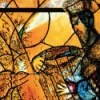
Download Reading Card
Personal note: I know a lot of your are suffering, but I humbly ask you to pray for my physical health, chaverim. There is always a shared blessing when we pray for others, as King David said in Psalm 35:13: "may what I prayed for happen to me!" (literally, "may it return upon my own breast" [תְּפִלָּתִי עַל־חֵיקִי תָשׁוּב]). Thank you so much....
Parashat Shemot

[ The following entry provides a brief overview of this week's Torah reading (Shemot). Please read the Torah portion to "find your place" here. ]
01.09.12 (Tevet 14, 5772) The Torah reading for this week is the very first of the Book of Exodus, called parashat Shemot (שְׁמוֹת). This portion begins directly where the narrative in the Book of Genesis left off, namely by listing the "names" (shemot) of the descendants of Jacob who came to Egypt to live in the land of Goshen. Over time Jacob's family flourished and multiplied so greatly that the new king of Egypt – who did not "remember" Joseph - regarded them as a threat and decided to enslave them. When the king's oppression did not curb their growth, however, he commanded the Hebrew midwives to kill all newborn Jewish boys. When the midwives refused to obey, however, the Pharaoh (insanely) commanded that all newborn boys were to be drowned in the Nile river (the Hebrew word for Egypt, Mitzrayim (מִצְרַיִם), can be rearranged to form the phrase tzar mayim (צַר מַיִם), meaning "torture through water," which was the plan of the wicked Pharaoh).
During this time of grave oppression, a family from the tribe of Levi bore a son and hid him for three months. When the baby could no longer be concealed, however, his mother Yocheved (יוֹכֶבֶד) set him afloat in the Nile River inside a basket, praying that he might somehow escape death. Miriam (מִרְיָם), the baby's sister, watched what would happen, and soon the basket was discovered by the daughter of Pharaoh, who decided to save the baby and adopt him as her own son. Miriam then cleverly offered to have her mother become the baby's wet-nurse for the princess. After the child was weaned, he was brought to Pharaoh's palace to live as the princess' son. The princess named him "Moses" (משֶׁה), meaning "drawn out" (מָשָׁה) of the water.
Later, when Moses was a full-grown man, he "went out to his people and looked on their burdens." When he saw an Egyptian beating an Israelite slave, he killed the Egyptian and hid his body in the sand. The following day he tried to reconcile two Israelites who were fighting, but the one in the wrong prophetically objected: "Who made you a prince and judge over us? Do you want to kill me as you killed the Egyptian yesterday?" Upon hearing this Moses decided to flee from Egypt to Midian. There he rescued Zipporah (צִפּרָה), the daughter of Yitro (יִתְרוֹ), a Midianite priest. Soon afterward, Moses decided to work for Yitro and married Zipporah. They had a son named Gershom (גֵּרְשׁם).
One day, as Moses was tending sheep, God called out to him from the midst of a burning bush and commissioned him to lead the Israelites out of Egypt back to the Promised Land. When Moses protested that he was inadequate for this task, God gave him three "signs" to authenticate his message. God also appointed his brother Aaron to be his spokesperson. Moses and Aaron then went to the Pharaoh and demanded that the Israelites be permitted to leave Egypt to worship the LORD in the wilderness. The Pharaoh, however, dismissed Moses and his God, and increased the workload of the slaves by forcing them to make bricks without straw.
As the Israelites suffered even more, Moses despaired over his mission and asked the LORD why he sent him to Pharaoh in the first place: "For since I came to Pharaoh to speak in your Name, he has done evil to this people, and you have not delivered your people at all." But the LORD replied to Moses, "Now you shall see what I will do to Pharaoh; for he shall let the people go because of a greater might; indeed, because of a greater might he shall drive them from his land."
 |
The Book of Exodus...

01.08.12 (Tevet 13, 5772) Over the next ten weeks (until the middle of March) we will be reading and studying the Book of Exodus and considering its message in light of revelation of Yeshua our Messiah.... There are forty chapters in this book (16,723 words, 63,529 letters) that are traditionally divided into eleven weekly Torah readings.
Some of the greatest narratives of all the Scriptures are found in this book, including the Israelites' enslavement and subsequent deliverance with the ten plagues by the hand of the LORD. After the very first Passover, Moses led the people out of the land Egypt, crossing the Sea of Reeds, and arriving at Sinai to receive the Torah exactly 49 day later.... While Moses was on the mountain, however, the people worshipped a Golden Calf, and a long period of repentance occurred until the covenant was reestablished. The remainder of the book describes the details and construction of the Mishkan (Tabernacle).
In English the word "Exodus" ("going out") comes from the title of the ancient Greek translation of the phrase Sefer Yetziat Mitzraim ("the book of the going out from Egypt"). Hence the Greek word ἔξοδος became "Exodus" in Latin which later was adopted into English. In the Hebrew Bible this book is called Shemot ("names"), following the custom of naming a book according to its first significant word.
May it please the LORD God of Israel to impart to us wisdom and insight as we study how the Book of Exodus reveals the inner Torah of Yeshua our Messiah. Amen.
 |
Shabbat Table Talk for Vayechi...
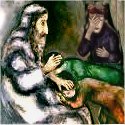
[ The following entry is related to this week's Torah reading (Vayechi). Please read the Torah portion to "find your place" here. ]
01.06.12 (Tevet 11, 5772) This Shabbat we finish reading the Book of Genesis for the Jewish year... The exclamatory phrase Chazak Chazak Venitchazek! (חָזַק חָזַק וְנִתְחַזֵּק) means "Be strong! Be strong! And may we be strengthened!" and is chanted in the synagogue after completing a book of Torah. A related phrase is yasher koach (יָשֶׁר כּחַ), which means "May your strength be firm," sometimes said to congratulate someone for performing a mitzvah (such as finishing a Torah reading, etc.).
The Book of Genesis (i.e., sefer bereshit) begins with an account of the creation of the universe and ends with Joseph being put into a coffin in Egypt. Note that the word translated "coffin" is the Hebrew word aron (אֲרוֹן), a word used elsewhere in the Torah to refer exclusively to the Ark of the Covenant. The last portion of Genesis - Parashat Vayechi – therefore functions as a transition between the theme of key individuals (e.g., Adam, Noach, Abraham, Isaac, Jacob, Judah, Joseph, etc.) in the Book of Genesis and the theme of the "children of Israel" in the Book of Exodus....
To help you discuss the very last Torah portion of the Book of Genesis, I wrote a new Shabbat "Table Talk" for Parashat Vayechi. Like others you can find on this site, first I include a brief summary of the reading followed by a set of questions and answers. Hopefully this material will prompt some interesting discussion for your Sabbath. You can download the PDF file from the linked page (above) or by directly clicking here:
We wish you a very peaceful and healing Shabbat, chaverim... These are difficult and perilous times in which we are living, but that means that our LORD gives us even more grace to hold fast to His love and kindness for us in this hour...
עֻזִּי אֵלֶיךָ אֲזַמֵּרָה
כִּי־אֱלהִים מִשְׂגַּבִּי
אֱלהֵי חַסְדִּי
u·zi · e·le·kha · a·zam·me·rah
ki · E·lo·him · mis·ga·bi
E·lo·hei · chas·di

"You are my Source of my strength! I will make music to you!
For God is my Towering Refuge,
the One who loves me (lit., 'the God of my love')"
(Psalm 59:17)

The Seedbed of Creation...
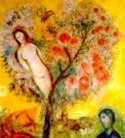
[ Since we are finishing the Book of Genesis (Bereshit) this Shabbat, I thought it would be worthwhile to review its foundational significance in light of the rest of the Scriptures... ]
01.06.12 (Tevet 11, 5772) The Book of Genesis (בְּרֵאשִׁית) is truly the "beginning," the "root," and the "seedbed" of all the subsequent Scriptures - including the message of the gospel and the revelation of the New Testament. In Genesis we see the creation and ruin of man through sin, but we take hold of the promise of deliverance through the coming Seed of the woman; in the Book of Exodus (שְׁמוֹת) we see God's powerful redemption secured through the blood of the Lamb; in the Book of Leviticus (וַיִּקְרָא) we encounter communion and atonement in the holy sanctuary; in the Book of Numbers (בַּמִדְבַּר) we experience the leading of God through desert places, and in the Book of Deuteronomy (הַדְּבָרִים) we are renewed by God's faithfulness before we take hold of our inheritance. Ultimately, the concluding book of the Bible, the Book of Revelation, serves as a climactic "final chapter" of the story begun in Genesis, where the Tree of Life (עֵץ הַחַיִּים) is restored to the midst of the paradise of God, and the presence of sin and death have been forever eradicated....
Everything begins with the foundational truth that Almighty God is our personal Creator (הַבּוֹרֵא). This is the first principle of all rational thinking: "In the beginning (בְּרֵאשִׁית), God created the heavens and the earth" (Gen. 1:1). Notice that the word "beginning," i.e., bereshit, comes from the word reishit (רֵאשִׁית), meaning first or best (Psalm 111:10), which does not necessarily mean "the beginning" in a temporal sense (הַרִאשׁוֹן), but rather primacy or rulership over all that exists. Indeed, the word includes the root idea of "head" (ראשׁ), which suggests the "head of all things," that is, to the Messiah, the Creative Word of God who is the "head of all beginning and authority" and through Whom and for Whom all things were created (Col. 1:16; 2:10).
Many of the Jewish sages state that "in the beginning" refers to the wisdom of the Torah. Quoting Proverbs 8:22, these sages go so far as to claim that God created the world for the sake of Torah, what they call "reshit darko" (רֵאשִׁית דַּרְכּוֹ). In other words, wisdom (חָכְמָה) is personified as the Torah, of which God "consulted" when he created the universe (some of the midrashim literally picture God reading the Torah to discover how to create the universe). I think it is better to understand wisdom as the first revealed attribute of God, metaphorically understood to be the exercise of God's will in creation... a picture of the "strong arm" of the LORD and his mighty power that created the enormous complexity of the universe yesh ma'ayin, "out of nothing..." Indeed, wisdom refers to Yeshua, the Lamb slain before the foundation of the world - the One revealed before creation as its source and end. Followers of the Messiah Yeshua do not worship a book, and surely God is not "bound" by the Torah in the sense of the Torah prescribing law to God Himself! God is the Lawgiver, the Source of all truth and therefore he can never contradict the perfections of his own inner nature. Only God receives the glory of creation forever and ever....
God freely chose to create the universe in order to share his wisdom, glory, and love with other beings he created... All this was for the sake of the Messiah, who built the world in chesed (חֶסֶד) and who forever reigns as the King of eternal life and love.
יְהוָה קָנָנִי רֵאשִׁית דַּרְכּוֹ קֶדֶם מִפְעָלָיו מֵאָז
Adonai · ka·na·ni · re·shit · dar·ko · ke·dem · mif·a·lav · me·az

"The LORD possessed me at the beginning of his way,
before his works of old" (Prov. 8:22)
The Book of Genesis itself begins by stating that on the "first day" God created the heavens and the earth:
בְּרֵאשִׁית בָּרָא אֱלהִים אֵת הַשָּׁמַיִם וְאֵת הָאָרֶץ
be·re·shit · ba·ra · E·lo·him · et · ha·sha·ma·yim · ve·et · ha·a·retz

"In the beginning God created the heavens and the earth"
(Gen. 1:1)
The term "heavens" here (שָׁמַיִם) refers metaphorically to God's exalted throne that was surrounded by innumerable angels who were present at the time of creation (Job 38:4-7), and the term "earth" (אָרֶץ) refers to a state of watery chaos (from רוּץ, suggesting running water) that was part of the primordial material of creation itself (indeed the word for "heavens," sha- (ש) + mayim (מַיִם), implies a connection with the original waters (mayim) of creation). God then created the divine light and separated it from darkness (Gen. 1:3-5). On the second day, God separated the waters to create the atmosphere (Gen. 1:6-8); on the third day, God separated the earth from the waters and created vegetative life and seeds (Gen. 1:9-13). On the fourth day, the cycle was renewed: God first created the celestial lights (sun, moon, stars) to mark the seasons and time (Gen. 1:14-19). On the fifth day, He brought forth fish from the waters and birds from the atmosphere (Gen. 1:20-23), and on the sixth day, God brought forth living creatures from the earth (Gen. 1:24-25), culminating in the creation of mankind in his image and likeness (Gen. 1:26-31). Of Adam, it was written, "whose father was God" (Luke 3:38), since he bore the divine seed that was to be "planted" and rooted in God's house of creation. The rest of the Bible, in a sense, is the story of the "prodigal son" and how he returns home to his father...
In the account of the creation given in Genesis, it is important to understand that the grammar of the text clearly speaks of creation in six literal days... The Hebrew word yom (יוֹם), or "day," always refer to a distinct 24 hour solar day when it is used in reference to evening and morning or when used in reference to a stated number of days. The formula, "it was evening, and it was morning, one day," further indicates that day follows night, since light was created (and separated) out of darkness. This explains why we start the Sabbath and festivals at sunset of the night before. The idea of a literal six days of creation is also the foundation for the weekly Sabbath itself: "For in six days the LORD made heaven and earth, the sea, and all that is in them, and rested on the seventh day. Therefore the LORD blessed the Sabbath day and made it holy" (Exod. 20:11).
The idea that "day" refers to an indefinitely long period of geological time is a modern invention based on Enlightenment ideals of science.... Attempting to reconcile so-called evolutionary theory with the account of creation given in the Torah actually undermines the message of the gospel itself, since it puts death, disease, suffering, etc., before the transgression of Adam and Eve. Moreover, it is evident that Yeshua believed in the literal creation of Adam and Eve (Mark 10:6) and therefore he held to a "young earth" theory, just as he believed in a worldwide (not local) flood during the days of Noah (Matt. 24:37-39).
Likewise the so-called "gap theory" (i.e., the idea that there is a "gap" of time between Gen. 1:1 and Gen. 1:2 wherein Satan was judged causing God to re-created the earth) is obviously in error since it disregards the testimony of Yeshua regarding the uniqueness of the creation of Adam and Eve "in the beginning," and it furthermore undermines the radical consequence of their sin. Neither does it adequately explain the mystery of evil (i.e., the presence of the "monster in the garden") nor the exile from the garden because of Adam and Eve's disobedience... It is true that later judgments of God allude to the idea of "tohu va'vohu" (e.g., Isa 34:11; Jer 4:23), but it must be stressed that this usage in the prophets should not be "read into" the description of the earth during creation.... There is no mention of a "gap" theory in the Scriptures, so it is an argument from silence, really, though there is a lot of witchcraft and midrash that talk about Lilith, etc. as Adam's first wife, etc. In the Fourth Commandment it is clearly stated that the heavens, the earth, the seas, and all that is in them were created in literally six days (Exod. 20:11). That God created the universe over a six day period (rather than in a single instant) is of course a mystery, though it is attested quite literally by the the hand of God Himself (Exod. 24:12; 31:18).
Notice finally that the Divine Light of the first day of creation (Gen 1:3) is not the same as the light of the cosmic spheres. God created the sun, moon, and stars on the fourth day to demonstrate that everything in the universe was created through the light of His Word (Gen. 1:14-19). If the sun had been created before everything else (big bang), it could have been said that the world was without beginning, and the earth produced life through the influences of astronomical bodies. The Torah states that plants were created before the sun and moon to indicate that nothing can exist apart from God's sovereign will. Yehi ... Vayhi ... God called everything into being by the Word of His Power.
וַיּאמֶר אֱלהִים יְהִי אוֹר וַיְהִי־אוֹר
וַיַּרְא אֱלהִים אֶת־הָאוֹר כִּי־טוֹב
וַיַּבְדֵּל אֱלהִים בֵּין הָאוֹר וּבֵין הַחשֶׁךְ
וַיִּקְרָא אֱלהִים לָאוֹר יוֹם וְלַחשֶׁךְ קָרָא לָיְלָה
וַיְהִי־עֶרֶב וַיְהִי־בקֶר יוֹם אֶחָד
va·yo·mer · E·lo·him · ye·hi · or, · vay·hi · or
va·yar · E·lo·him · et · ha·or · ki · tov
va·yav·del · E·lo·him · ben · ha·or · u·ven · ha·cho·shekh
va·yik·ra · E·lo·him · la·or · yom · ve·la·cho·shekh · ka·ra · lai·lah
vay·hi · e·rev · vay·hi · vo·ker · yom · e·chad

"And God said, "Let there be light," and there was light.
And God saw that the light was good.
And God separated the light from the darkness.
God called the light Day, and the darkness he called Night.
And there was evening and there was morning, the first day."
(Gen. 1:3-5)
Notice that the word "light" appears five times in this passage, which prompted the sages to say there are five kinds of light, each corresponding to a book of the Torah. "Let there be light" refers to the Book of Genesis and the Divine Light; "and there was light" refers to the Book of Exodus, when during their deliverance from Egypt Israel had redemptive light within their homes; "God saw the light" refers to the Book of Leviticus, which deals with the light of sacrifice and atonement - the light of teshuvah; "God separated the light from the darkness" refers to the Book of Numbers, when God judged evil in the ways of the desert; and finally, "God called the light Day" refers to the Book of Deuteronomy, which enlightens the eyes of those who live by Torah....
Sufficiency from God...

01.05.12 (Tevet 10, 5772) We must always be on guard against flattering ourselves, since the "flesh" naturally assumes that there is something we must add or may contribute to God's work of salvation given in Yeshua... Human pride is always scandalized by the message of the cross, since the cross represents the radical insufficiency of the ego to please God... There is absolutely nothing we have to commend ourselves to God, and even our faith is a miracle based on divine prerogative and not our own wisdom. "If anyone thinks he is something, when he is nothing, he deceives himself" (Gal. 6:3). God does not ransom the soul so that the flesh may be coddled or appeased. There is one verdict for all of us, there is one "narrow gate" that leads to life, and that gate is opened through the inner confession that we are hopeless sinners who are entirely unable to save ourselves. This is why the "gate is narrow and the way is hard (θλίβω) that leads to life, and those who find it are few" (Matt. 7:14). The salvation of the soul is tribulation (θλῖψις) for the flesh...
Yeshua didn't die a painful and bloody death on the cross to save sinful flesh but to become sinful flesh in exchange for the sinner who trusts in Him (2 Cor. 5:21). The cross is not the place of "moral reformation" but rather the confession of our own death. We don't come to the cross to get "cleaned up" but rather to die and be reborn. By faith there is a divine exchange, whereby the natural life is crucified and buried and the spirit is miraculously reborn and given life from heaven, but (again) even this faith is a gift from God... Previously we were described as "dead" in our sinful state - the living dead, if you will - until God sovereignly opened our eyes to personally reveal the truth to us. Now we "take up the cross" by identifying all that we are with Yeshua. We live in a state of ongoing dependence. The entire process of salvation and sanctification entails being a humble witness of what God's great power has done and is doing for you....
יְהוָה תִּשְׁפּת שָׁלוֹם לָנוּ
כִּי גַּם כָּל־מַעֲשֵׂינוּ פָּעַלְתָּ לָּנוּ
Adonai · tishpot · shalom · lanu
ki · gam · kol · ma'asenu · pa'alta · lanu

"O LORD, you will establish peace for us,
for You have indeed done for us all our works."
(Isa. 26:12)
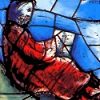
Hebrew Study Card
God does the work "for us" (לָּנוּ) and we are His witnesses... Salvation is "of the LORD," and is not the result of our own efforts. Anything of eternal value comes from God alone, who is the beginning and end of grace. "Not by (human) might, nor by (human) power, but by my Spirit, says the LORD of hosts (Zech. 4:6). If we lose sight of this truth, we are again made subject to the "law of sin and death" (תּוֹרַת הַחֵטְא וְהַמָּוֶת), that is, the futile principle of self-justification that constitutes the "wheel of suffering." We can escape this cycle only by means of the cross of Yeshua, where we accept the truth about our condition and trust God for our deliverance. It is the "law of the Spirit of Life" (תוֹרַת רוּחַ הַחַיִּים), that is, the inner reign of the Holy Spirit, that sets us free from the reign of sin that leads to death.
וְהָיָה מַעֲשֵׂה הַצְּדָקָה שָׁלוֹם
וַעֲבדַת הַצְּדָקָה הַשְׁקֵט וָבֶטַח עַד־עוֹלָם
vehayah · ma'aseh · hatzedakah · shalom
va'avodat · hatzedakah · hashket · va'betach · ad-olam

"And the work of the Righteousness One will be peace,
and the service of Righteousness One will be quietness and assurance forever."
(Isa. 32:17)
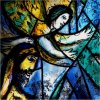
Note that it is the "work" (singular) of righteousness that is in view here – not the "works" of righteousness (plural) which we might perform (Titus 3:5). In other words, it is the work of the LORD alone, that is, the righteousness and glory of the Messiah, blessed be He, that gives us true peace. As it is written, "The salvation of the righteous comes from the LORD; he is their stronghold in time of trouble" (וּתְשׁוּעַת צַדִּיקִים מֵיְהוָה מָעוּזָּם בְּעֵת צָרָה); Psalm 37:39. Likewise the "service of righteousness" refers to the singular "avodah" of the great High Priest "after the order of Malki-Tzedek," which is the eternal service of intercession established in the decreed will and counsel of God Almighty (Heb. 7:20-21). This does not refer to acts of service performed by human beings in their religious ceremonies (i.e., the Levitical priesthood with its various forms of sacrificial worship), but rather the perfect act of service and sacrifice of Yeshua given upon the cross -- the everlasting atonement and eternal redemption secured by the priesthood of Yeshua (Heb. 9:12). "For our sake He made him to be sin who knew no sin, so that in him we might become the righteousness of God (δικαιοσύνη θεοῦ)." Only God through Yeshua can give us true inner peace and security forever... Only Yeshua gives us peace with God....
Singing Thanks for God's Salvation
In light of the great marvel of the salvation given to us in Yeshua our LORD, it is surely good to offer praise and thanks to the LORD God of Israel:
הִנֵּה אֵל יְשׁוּעָתִי אֶבְטַח וְלא אֶפְחָד
כִּי־עָזִּי וְזִמְרָת יָהּ יְהוָה
וַיְהִי־לִי לִישׁוּעָה
hin·nei · el · ye·shu·a·ti · ev·tach · ve·lo · e·fe·chad
ki · o·zi · ve·zim·rat · Yah · Adonai
vai·hi · li · li·shu·ah

"Behold, God is my salvation; I will trust, and will not be afraid;
for the LORD GOD is my strength and my song,
and he has become my salvation."
(Isa. 12:2)

Download Study Card
Suffering and Hidden Good
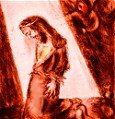
[ The following entry is related to this week's Torah reading (Vayechi). Please read the Torah portion to "find your place" here. ]
01.04.12 (Tevet 9, 5772) The sages say that most people die because of jealousy/envy (i.e., the "evil eye" that expresses selfishness). However, since Joseph refrained from looking with lust upon Potiphar's wife, Jacob prophetically blessed him by saying that he was a "fruitful son over the eye" (בּן פּרָת עֲלֵי־עָיִן), implying that the good eye of his faith, ayin tovah (עַיִן טוֹבָה), would enable him to overcome evil (Gen. 49:22). Likewise Yeshua said the eye was the "lamp of the body." When your eye is healthy (ayin tovah), your whole body is full of light, but when it is bad (ayin hara), your body is full of darkness. Therefore be careful lest the light in you be darkness (Luke 11:34-35).
The eye can become "darkened" by failing to believe that God has deeper purposes and meanings hidden in the various trials of life. Joseph used the good eye and later testified that God intended everything that had happened to him -- including the betrayal by his own brothers -- for good:
וְאַתֶּם חֲשַׁבְתֶּם עָלַי רָעָה אֱלהִים חֲשָׁבָהּ לְטבָה
לְמַעַן עֲשׂה כַּיּוֹם הַזֶּה לְהַחֲית עַם־רָב
ve·at·tem · ha·shav·tem · a·lai · ra·ah · E·lo·him · ha·sha·vat · le·to·vah
le·ma·an · a·so · ka·yom · haz·zeh · le·ha·cha·yot · am · rav

"As for you, you meant evil against me, but God meant it for good,
to bring it about that many people should be kept alive, as they are today."
(Gen. 50:20)

Joseph used the "good eye" to apprehend God's hidden purpose for the testing he faced... He lived in conscious trust that God loved him and had a plan for his life -- despite the treachery and painful rejection he faced from his own family. The eye of emunah (faith) ultimately affirms: gam zu l'tovah (גַּם זוּ לְטוֹבָה), "this too is for good" (cp. Rom. 8:28) and reframes the question of why there is suffering and evil in a universe created by an all-powerful and all-loving God... Emunah "sees what is invisible" (2 Cor. 4:18) and understands (i.e., accepts) that the "present form of this world is passing away" for purposes that are good (1 Cor. 7:31). It affirms that underlying the surface appearance of life (chayei sha'ah) is a deeper reality (chayei olam) that is ultimately real, abiding, and ultimately designed for God's redemptive love to be fully expressed. In this world we must "see through" a mirror (i.e., indirectly) to begin to see the dawn of our eternal home; but one day we will behold God panim el panim (פָּנִים אֶל־פָּנִים), "face to face" (1 Cor. 13:12).
The story of Joseph reveals that God may use suffering in our lives for hidden and future good... After all, the LORD is the Master of the Universe who can overrule any expression of evil for His greater good. No one can overrule His decrees or upend His sovereign authority and power over creation. The eye of faith, however, does not see "in hindsight" regarding how all things work together for good... On the contrary, faith sees real evil, encounters the present hour of darkness, and yet declares that God will overrule its intent for His glory and the outworking of His goodness...
"Take care, brothers and sisters, that none of you has an evil, unbelieving heart that forsakes the living God (אלהִים חַיִּים). But exhort one another (i.e., παρακαλέω – call one another over to give account) every day - as long there is still time - so that none of you may be hardened (σκληρύνω) by the deceitfulness of sin. For we have become inheritors with the Messiah, if indeed we hold our original confidence firm to the end" (Heb. 3:12-14).
 |
Vine and Branches...

Live in Yeshua, and Yeshua will live in you...
01.02.12 (Tevet 7, 5772) Yeshua used the allegory of a vine and its branches to illustrate how we are to be spiritually connected to Him. The purpose of the branch is to be a conduit of the life of the vine. Vine branches by themselves are of little value, apart from the manifestation of fruit; they cannot be used for building things and otherwise are regarded as bramble (Ezek. 15:2-4). Notice further that the vine branch cannot bear good fruit while it remains on the ground: it must "climb" upward and be elevated. And if you look closely at a vine, it is often difficult to see where the vine ends and the branches begin. The life of the branch becomes "entangled" in God's love as it bears spiritual fruit from the sustenance of the True Vine (הַגֶּפֶן הָאֲמִתִּית). When we abide in, or are truly connected with, Yeshua as the Source of life, we bear the fragrance and sweet-smelling savor of heaven itself...
אֲנִי הַגֶּפֶן אַתֶּם הַשָּׂרִיגִים
הָעוֹמֵד בִּי וַאֲנִי בּוֹ
עוֹשֶׂה הַרְבֵּה פִּרִי
שֶׁכֵּן בִּלְעֲדַי אֵינְכֶם יְכוֹלִים לַעֲשׂוֹת דָּבָר
a·ni · ha·ge·fen · at·tem · ha·sa·ri·gim
ha·o·med · bi · va·ani · bo
o·seh · har·beh · pe·ri
she·ken · bil·a·dai · ey·ne·khem · ye·kho·lim · la·a·sot · da·var

"I am the vine; you are the branches.
Whoever lives in me and I in him,
he it is that bears much fruit,
for apart from me you can do nothing.
(John 15:5)
ἐγώ εἰμι ἡ ἄμπελος, ὑμεῖς τὰ κλήματα.
ὁ μένων ἐν ἐμοὶ κἀγὼ ἐν αὐτῷ
οὗτος φέρει καρπὸν πολύν,
ὅτι χωρὶς ἐμοῦ οὐ δύνασθε ποιεῖν οὐδέν

The expression "apart from me" (χωρὶς ἐμοῦ) means being in a state of separation from Yeshua, which is likened to spiritual death... It is the death of possibility, the absence of power to yield true good to the world, and so on. This is what is meant by "you can do nothing" (οὐ δύνασθε ποιεῖν οὐδέν), that is, you can do nothing of any eternal significance or worth... There is simply no true life apart from the Savior. "The fruit of the righteous is like the Tree of Life (עֵץ חַיִּים), and whoever captures souls is wise (Prov. 11:30). "God is the gift of love; God is both the offering and the fire of the altar, and through God's hand is the sacrifice rendered true."
Please do not disregard the admonishment found in the immediately following verse: "If anyone does not abide in me he is thrown away like a branch and withers; and the branches are gathered, thrown into the fire, and burned" (John 15:6). When the branch is severed from the vine, it withers and eventually will die. It is no longer worth anything apart from being used to kindle a fire...
Living in vital union with Yeshua is all-important, friends. Those who do not continue "abiding" in Him are mere professors or spiritual impostors who have never really known real connection with him (1 John 2:19). Similarly, the prophet Ezekiel described apostate Judah as a "useless vine" that was ready to be finally devastated in God's judgment: Jerusalem would be burned, the Temple razed, and its inhabitants destroyed by God's agent of retribution named Nebuchadnezzar (Ezek. 15:1-8).
God is the "Vine Dresser," and the vine branches require a lot of ongoing care and maintenance for the vine to produce genuine fruit... For instance, they must be pruned lest they become wild grapes or useless "sucker" branches... Yeshua described himself as the "true vine," which means that His connection with the Father is entirely trustworthy because it is grounded in reality and truth. Abiding in Yeshua is the means by which we are connected to God, and through our relationship with Him God produces genuine spiritual fruit in our lives: "Only God gives the growth" (1 Cor. 3:7).
The bottom line is simply "live in Yeshua, and Yeshua will live in you" -
עִמְדוּ בִּי וַאֲנִי בָּכֶם
כְּמוֹ שֶׁהַשָּׂרִיג אֵינְנוּ יָכוֹל לַעֲשׂוֹה פְּרִי מֵאֵלָיו
אִם לא יַעֲמוֹד בַּגֶּפֶן
כָּךְ גַּם אַתֶּם אִם־לא תַעַמְדוּ בִּי
im·du · bi · va·a·ni · ba·khem
ke·mo · she·ha·sa·rig · ei·ne·nu · ya·khol · la·a·sot · pe·ri · me·e·lav
im · lo · ya·a·mot · ba·ge·fen
kakh · gam · at·tem · im · lo · ta·am·du · bi

"Live in me, and I will live in you.
Just as a branch cannot bear fruit by itself,
unless it lives in the vine,
neither can you, unless you live in me."
(John 15:4)
Μείνατε ἐν ἐμοί, κἀγὼ ἐν ὑμῖν.
Καθὼς τὸ κλῆμα οὐ δύναται καρπὸν φέρειν ἀφ᾽ ἑαυτοῦ,
ἐὰν μὴ μείνῃ ἐν τῇ ἀμπέλῳ,
οὕτως οὐδὲ ὑμεῖς, ἐὰν μὴ ἐν ἐμοὶ μείνητε.
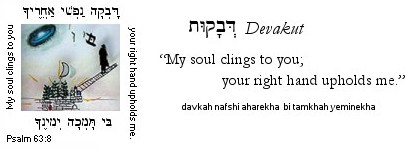
Yeshua said, "I am the true Vine (הַגֶּפֶן הָאֲמִתִּית), and you are the branches" (John 15:1-6). We derive our identity, life and strength from being made part of His life, His vision, and His purposes... In Hebrew, this idea is called devakut (דְּבָקוּת) which means "cleaving" to God bekhol-levavkha (בְּכָל־לְבָבְךָ), "with all your heart," and bekhol-nafshekha (בְּכָל־נַפְשְׁךָ), "with all your soul," and bekhol-me'odekha (בְּכָל־מְאדֶךָ), "with all your being..." It is the essence of the great commandment to love God given in the Shema. We are able to so cleave to God in Yeshua because God does a miracle and gives us a new heart to serve Him. We love Him because He first loved us (1 John 4:19).
Whether Yeshua is living in you (and you are living in Him) is the most important question of your life upon which everything else turns. The great mystery is "Christ in you, the hope of glory" (Col. 1:27). As Ravenhill once said, "I don't ask people if they're saved anymore; I look them straight in the eye and say, "Does Christ live inside you?" Indeed, He is present right now -- for you -- in this very moment... Are you connected with Him in the truth? Are you drawing life from His life? Do you really live in Yeshua?
Of course it is a struggle to keep our focus along the way, and there are various tests we all will experience, including the tests of apathy, weariness, confusion, and so on... We must ask the LORD God of Israel to awaken us to His resurrected and all-glorious Presence. His radiance fills the heaven and the earth, and by faith we take hold of hope with wonder, praise, and great joy.... May it please God to help each of us "put on the new self, created after the likeness of God in true righteousness and holiness" (Eph. 4:24). Amen.
 |
Parashat Vayechi - ויחי
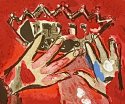
[ The Torah reading for this week (Vayechi) is the last of Sefer Bereshit (the Book of Genesis). After we study this portion we will begin reading the Book of Exodus... Chazak, Chazak, Venitchazek! ]
01.01.12 (Tevet 6, 5772) Jacob had lived in Egypt for 17 years when he fell ill and realized he would soon die while living in exile... In preparation for his death, he asked his son Joseph to solemnly promise to bury him in the land of Canaan and not to bury him in Egypt. As Joseph made the promise, Jacob "bowed his head" (Gen. 47:31), which indicated that Joseph's dream that even his father would bow down to him was fulfilled (the eschatological significance is that Yeshua [Mashiach ben Yosef] will carry the children of Israel from their exile to the Promised Land before the end of the age.)
As Jacob's condition worsened, Joseph brought his sons Manasseh and Ephraim to visit his ailing father. Jacob strengthened himself and blessed the men, adopting them as his own direct descendants ("they shall be mine, as Reuben and Simeon are"), and thereby giving them the status of full tribes of Israel. As he reached out to lay his hands on them, however, Jacob prophetically crossed his arms so that the younger received the blessing of the older. When Joseph attempted to correct him, Jacob told him that he knew what he was doing and then predicted that Ephraim would surpass Manasseh in greatness (perhaps foreseeing the role Joshua would later play by leading the nation back to the promised land). Jacob then gave Joseph an extra portion of his inheritance (i.e., the land of Shechem) which indicated that he was regarded as the firstborn son of Israel.
After this, Jacob called for all his sons to come hear his final words and to receive his prophetic blessing. Among other things, Jacob foretold that the Messiah would come from the line of Judah and affirmed that the descendents of Joseph would be blessed beyond the other tribes. Jacob then died and was mourned in Egypt for 70 days. A great Egyptian procession accompanied Joseph and his brothers back to the land of Canaan where they observed a seven-day period of mourning (shiva). After the burial, the family returned to Egypt, and the brothers began to fear that Joseph would now take revenge against them for having sold him into slavery. Joseph reassured them that they had no reason to fear him and reminded them that God had overruled their earlier intent by intending him to be a blessing to the whole world. The portion ends with the account of Joseph's death at age 110. Like his father, Joseph asked to have his bones taken to Canaan for burial when the Jews finally left Egypt.
 |
The Fast of Tevet - עשרה בטבת
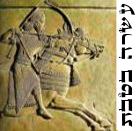
01.01.12 (Tevet 6, 5772) Asarah B'Tevet (עשרה בטבת) means "the Tenth of Tevet," which is the traditional date that recalls the start of Nebuchadnezzar's attack on Jerusalem (in 587 BC) that led to the destruction of the Holy Temple and the eventual exile of the Jewish people. Religious Jews observe this date as a "minor" fast day (i.e., a fast observed from sunrise to sunset) to recall the tragedy and to afflict their souls. This year Asarah B'Tevet occurs on Thursday, January 5th.
In Israel, Asarah B'Tevet also marks the day Kaddish is recited for people whose date or place of death is unknown. This has resulted in a day of mourning for the many Jews who perished during the Holocaust. Synagogue services normally include prayers of repentance (selichot) and the Torah portion recalls the story of the idolatry of the golden calf (Exod. 32:11-34:10).
Messianic Jewish scholar Alfred Edersheim wrote that an early Aramaic source document called "The Scroll of Fasts" (i.e., Megillat Ta'anit: מְגִילַת תַעֲנִית), which included additional commentary in medieval Hebrew (called scholium), may refer to the 9th of Tevet as the day of Yeshua's birth (i.e., sometime during late December in our Gregorian calendars). Note that Jewish history regards the month of Tevet to be one of national tragedy, marking the beginning of the destruction of the Holy Temple by Nebuchadnezzar, King of Babylon (in 587 BC). After the destruction of the Second Temple in 70 AD, the early sages might have associated the birth of Yeshua as yet another reason for mourning the loss of the Temple on this date. (For more about the controversial date of the birth of Yeshua, see the article, "Christmas: Was Jesus really born on December 25th?")
 |
<< Return
|









































































